53 Best Alcohol and Drug Rehabs in New Hampshire 2025
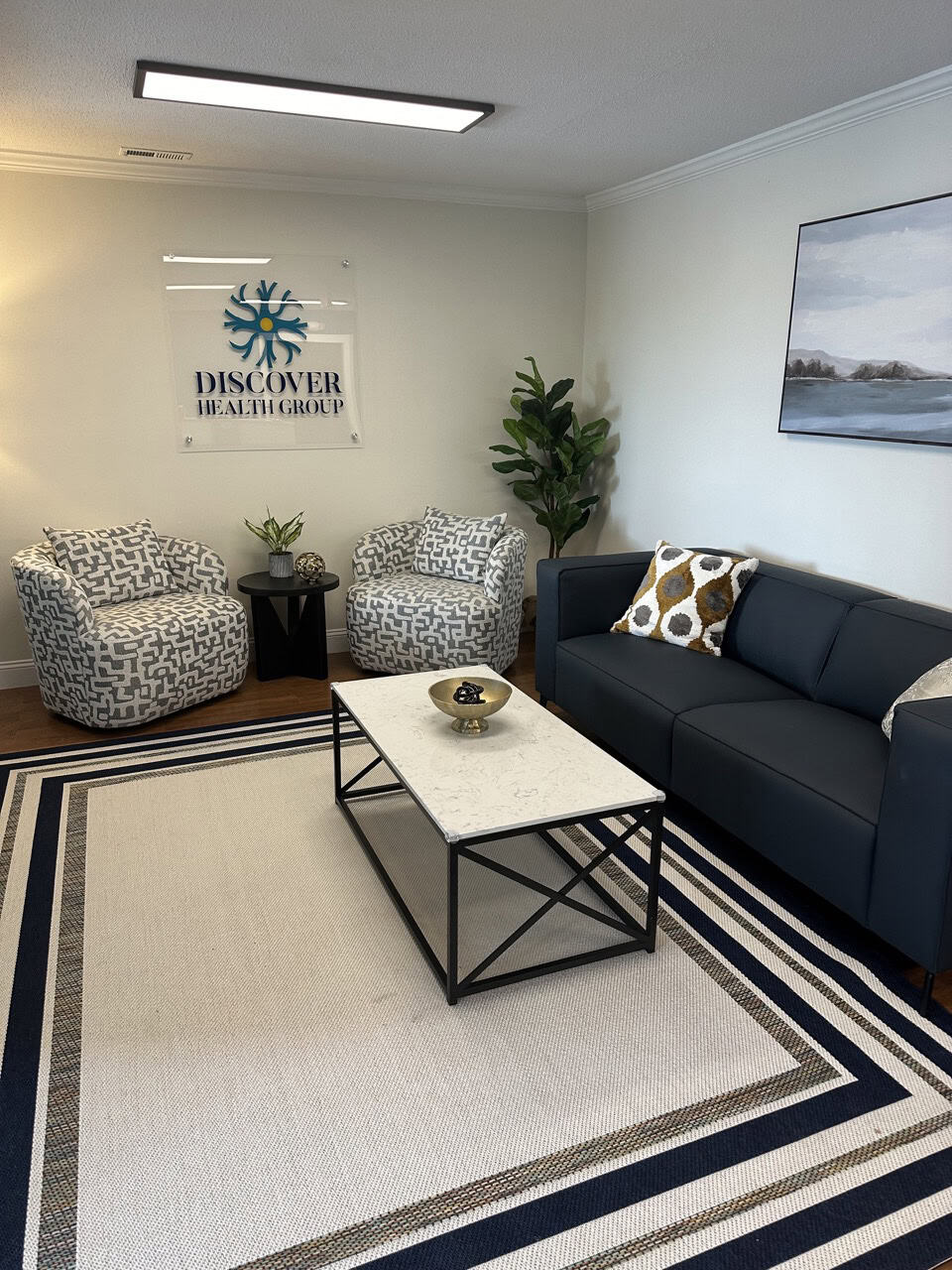
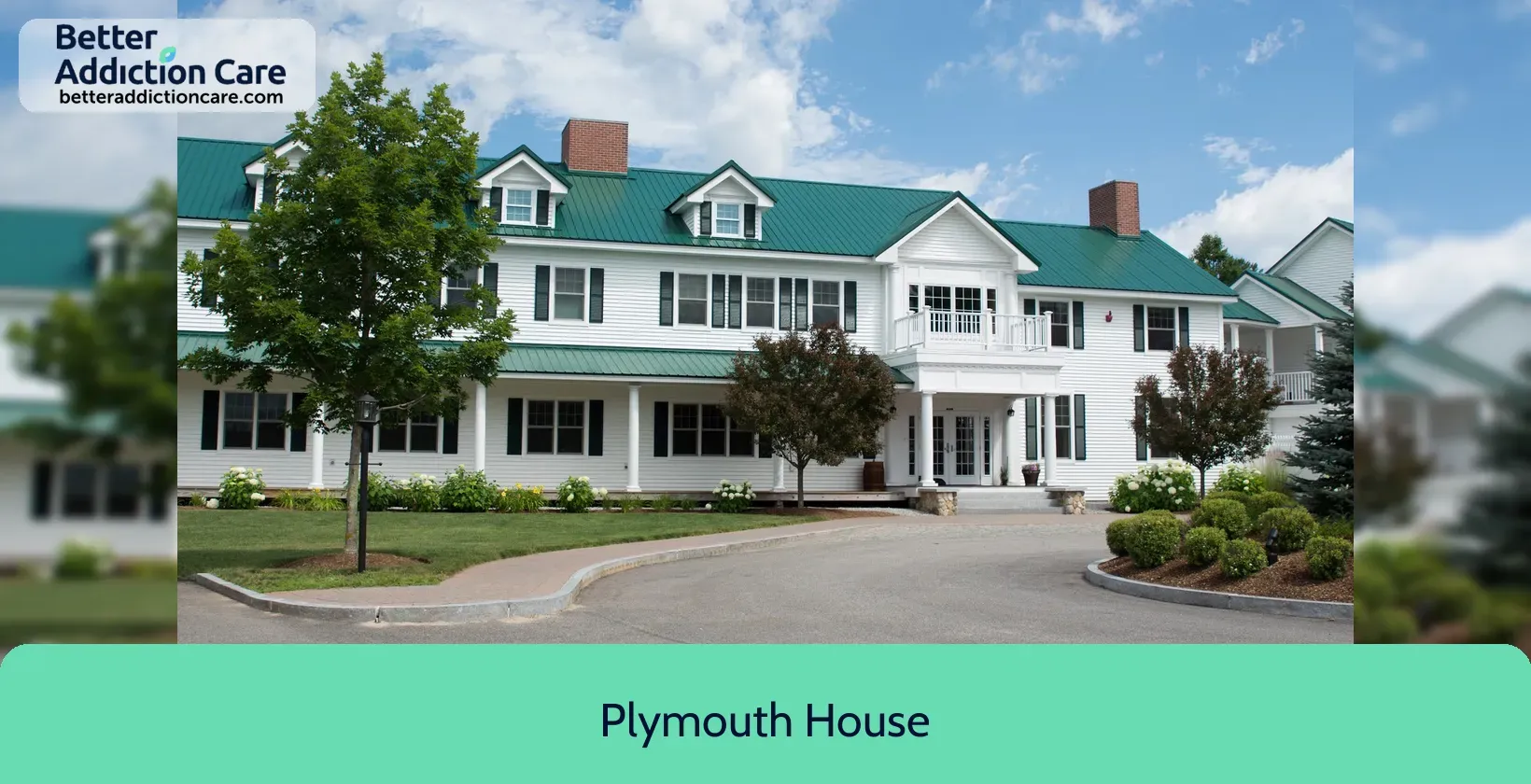
7.35
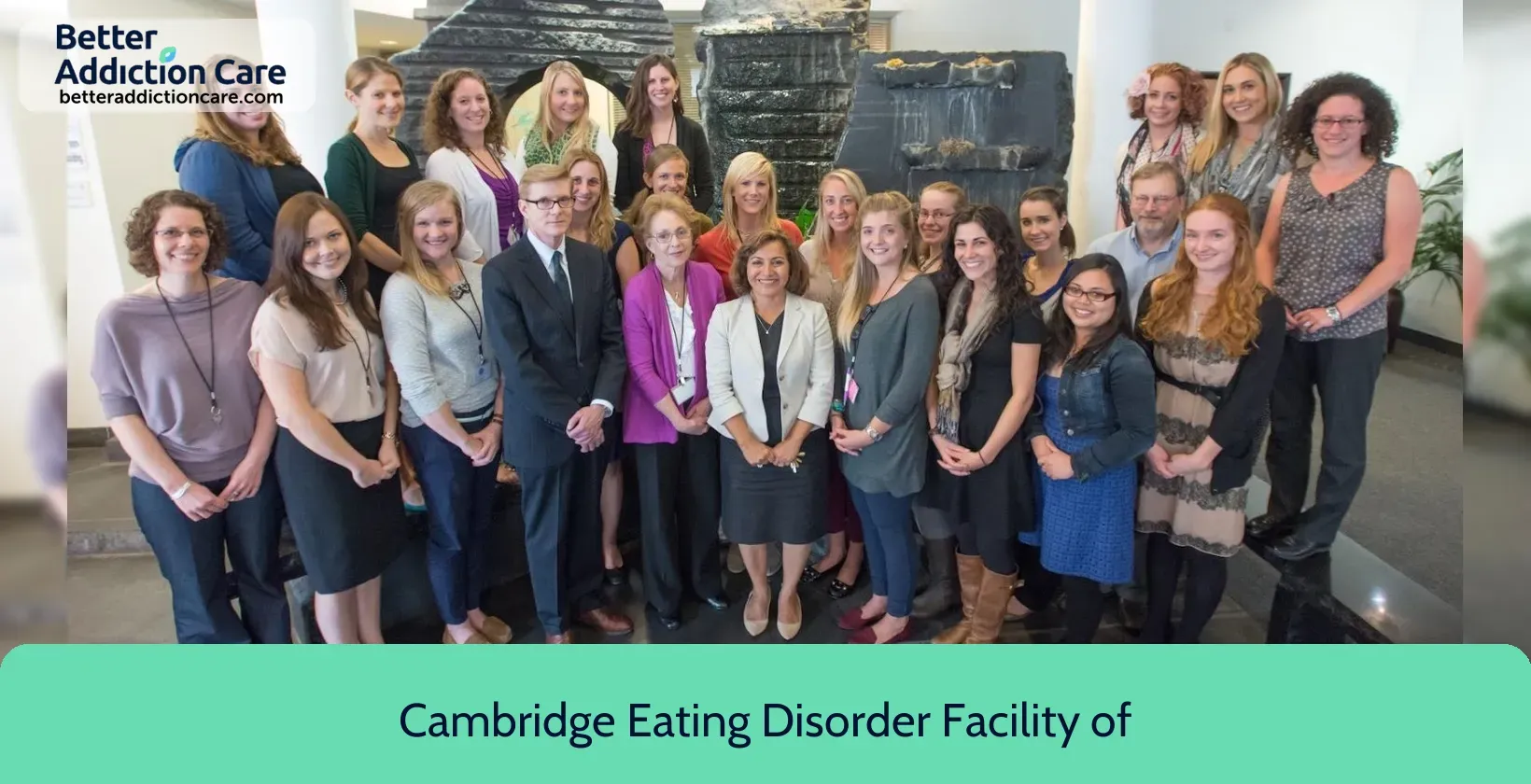
6.68
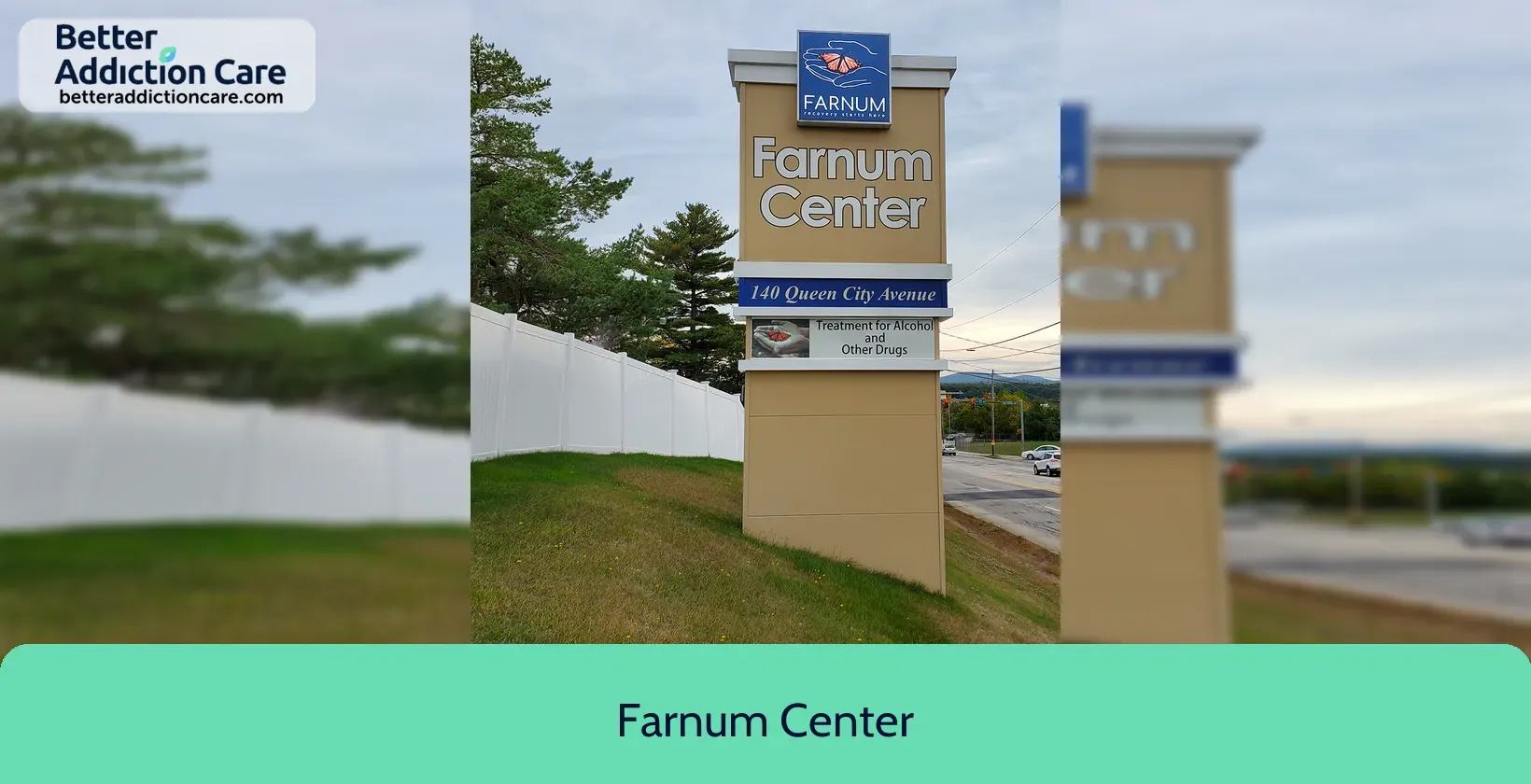
7.49
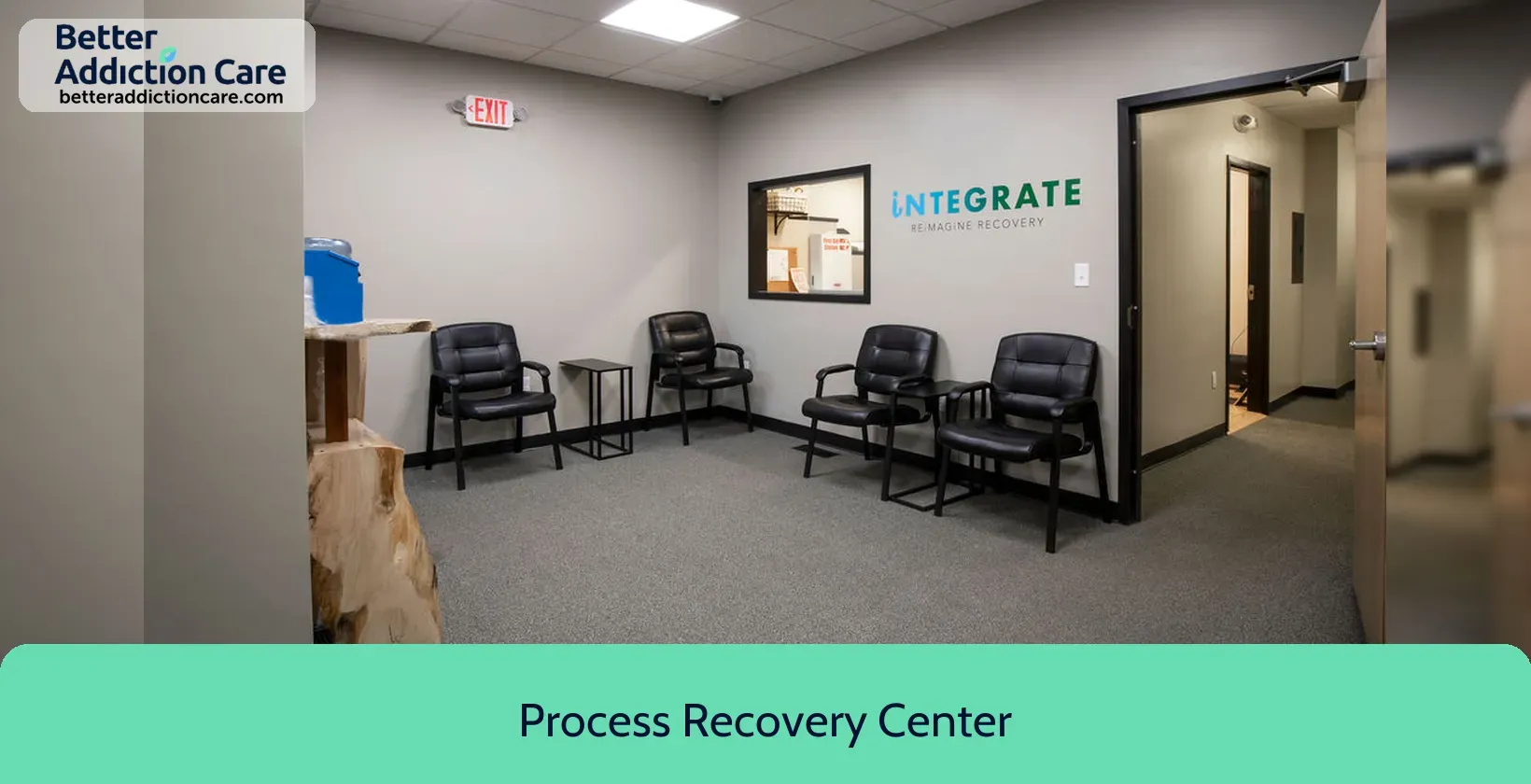
7.48
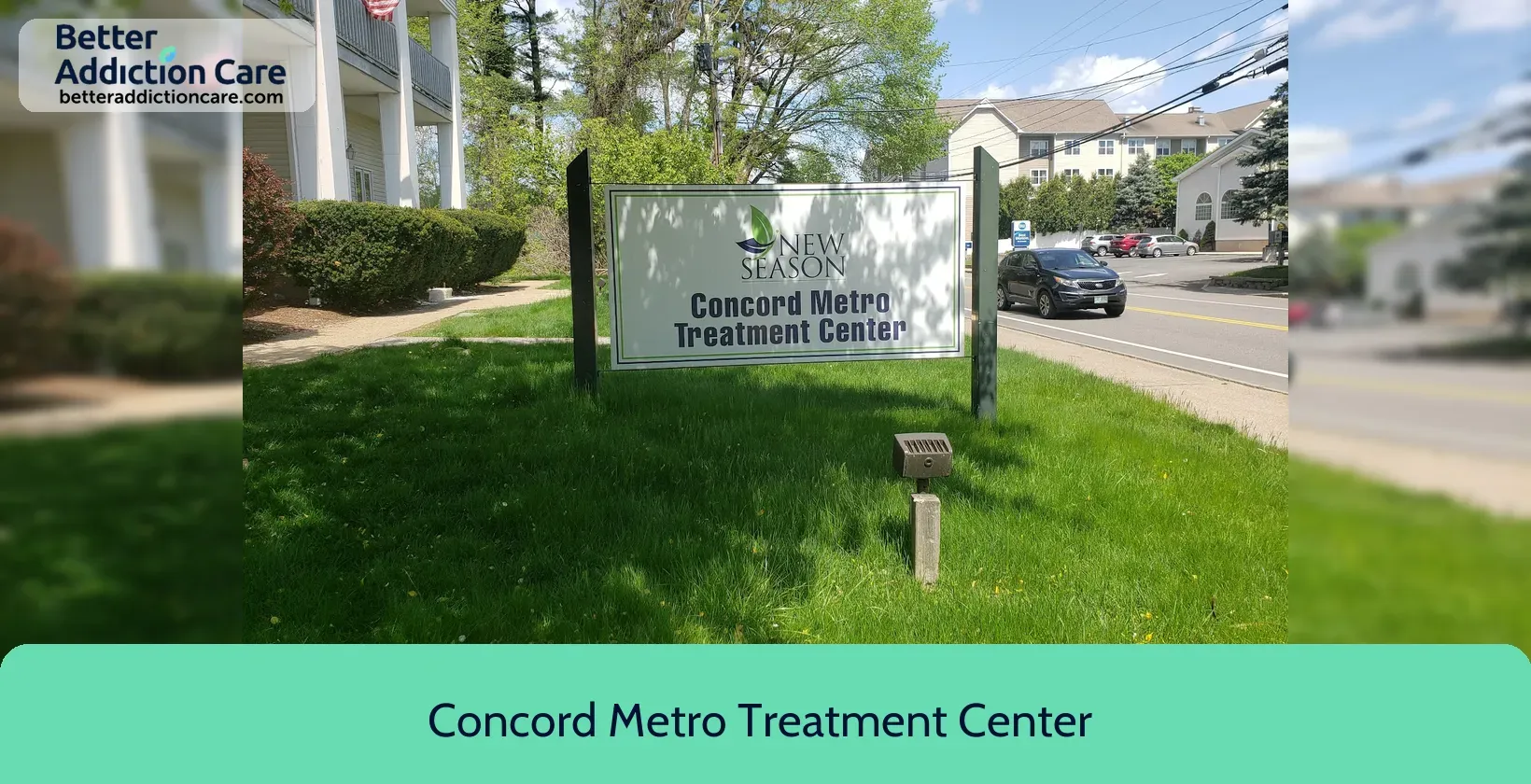
7.37
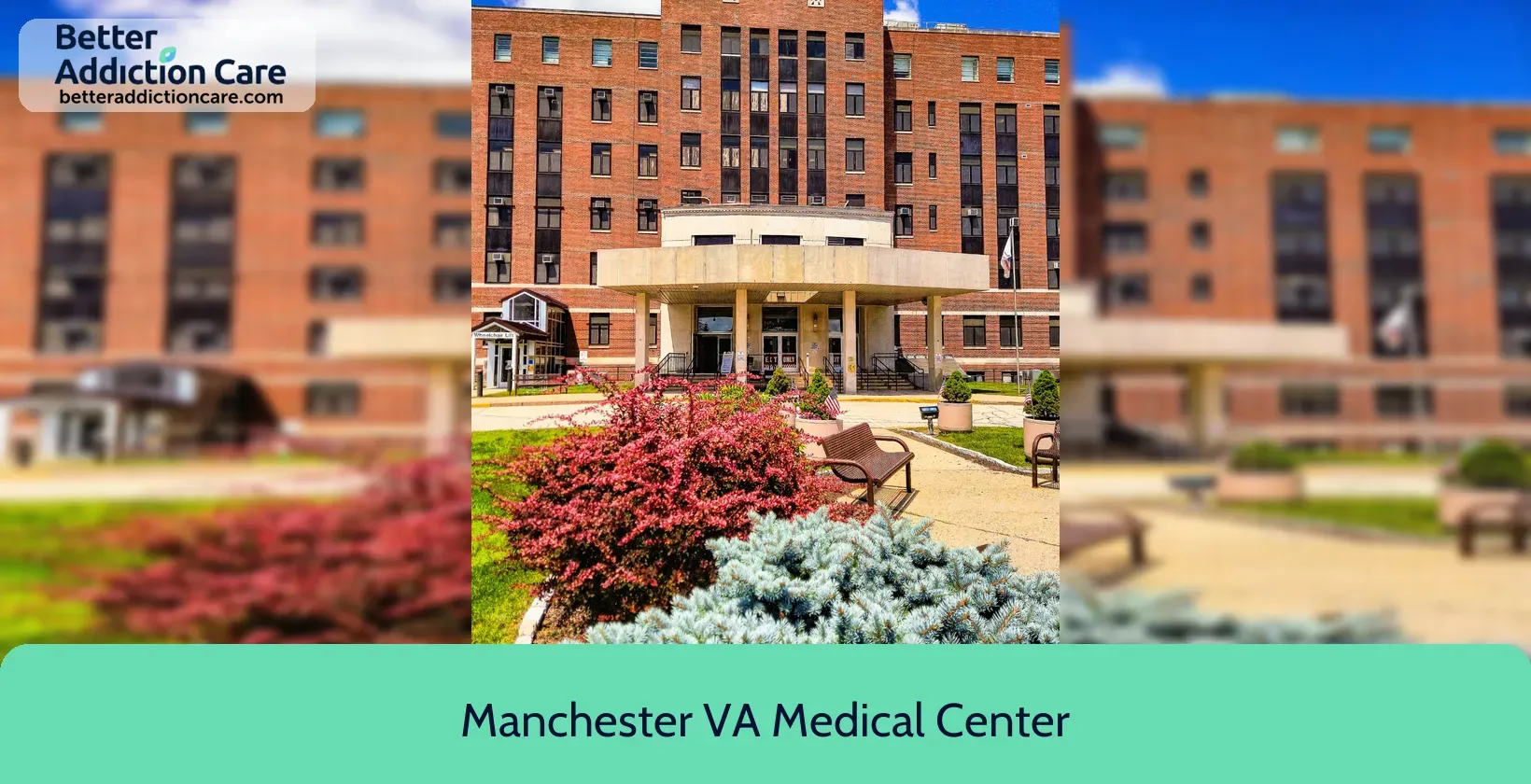
6.91
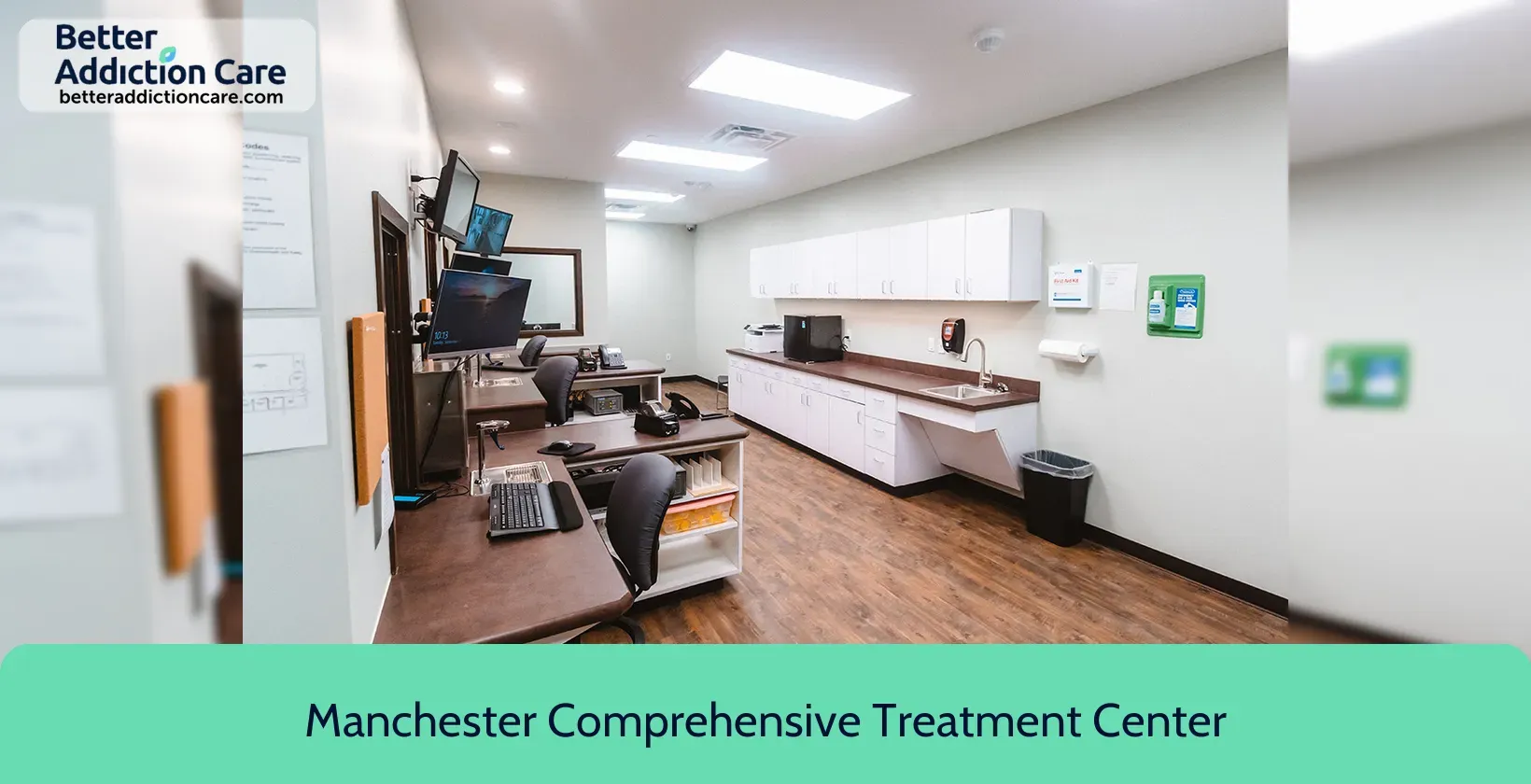
7.20
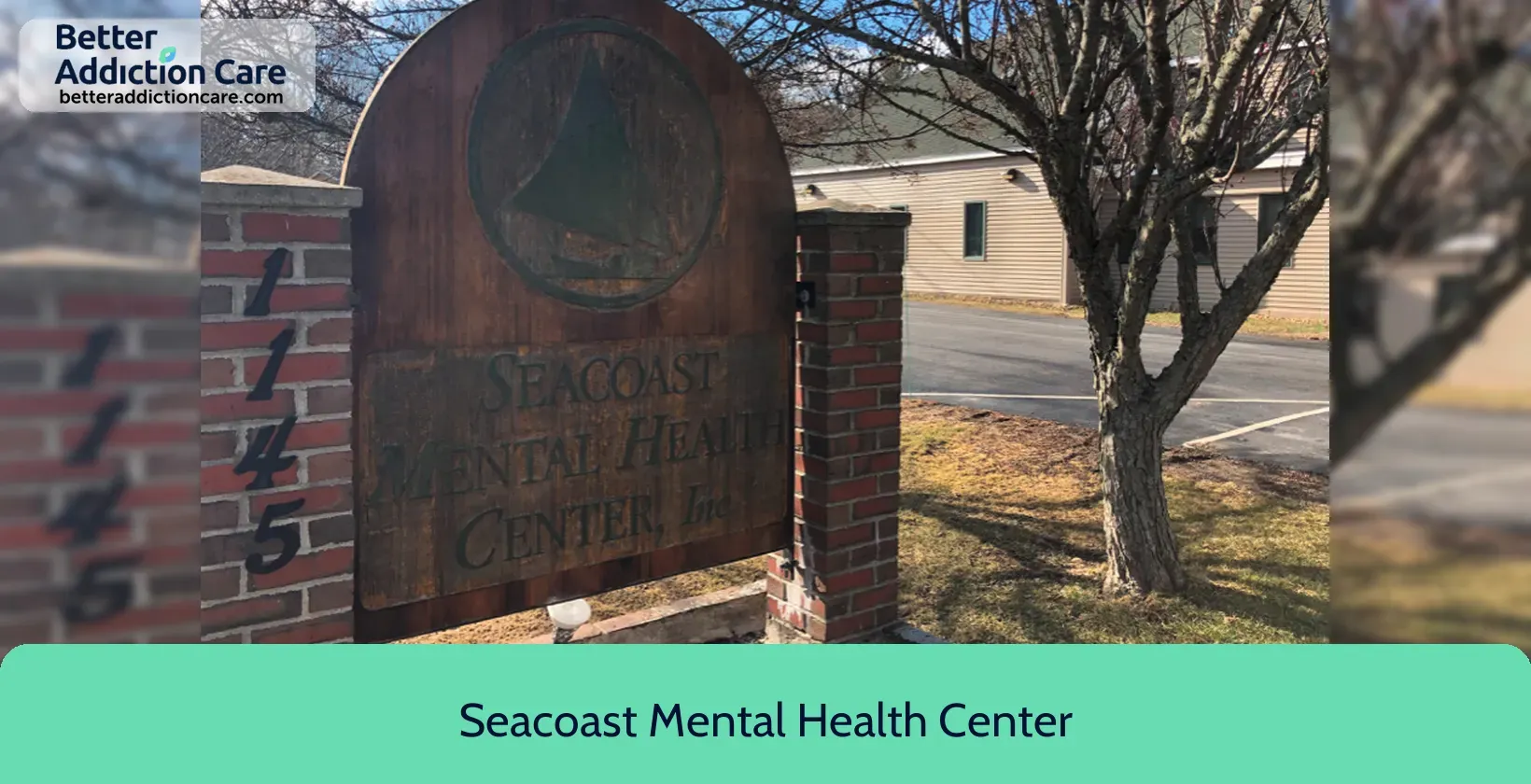
7.51
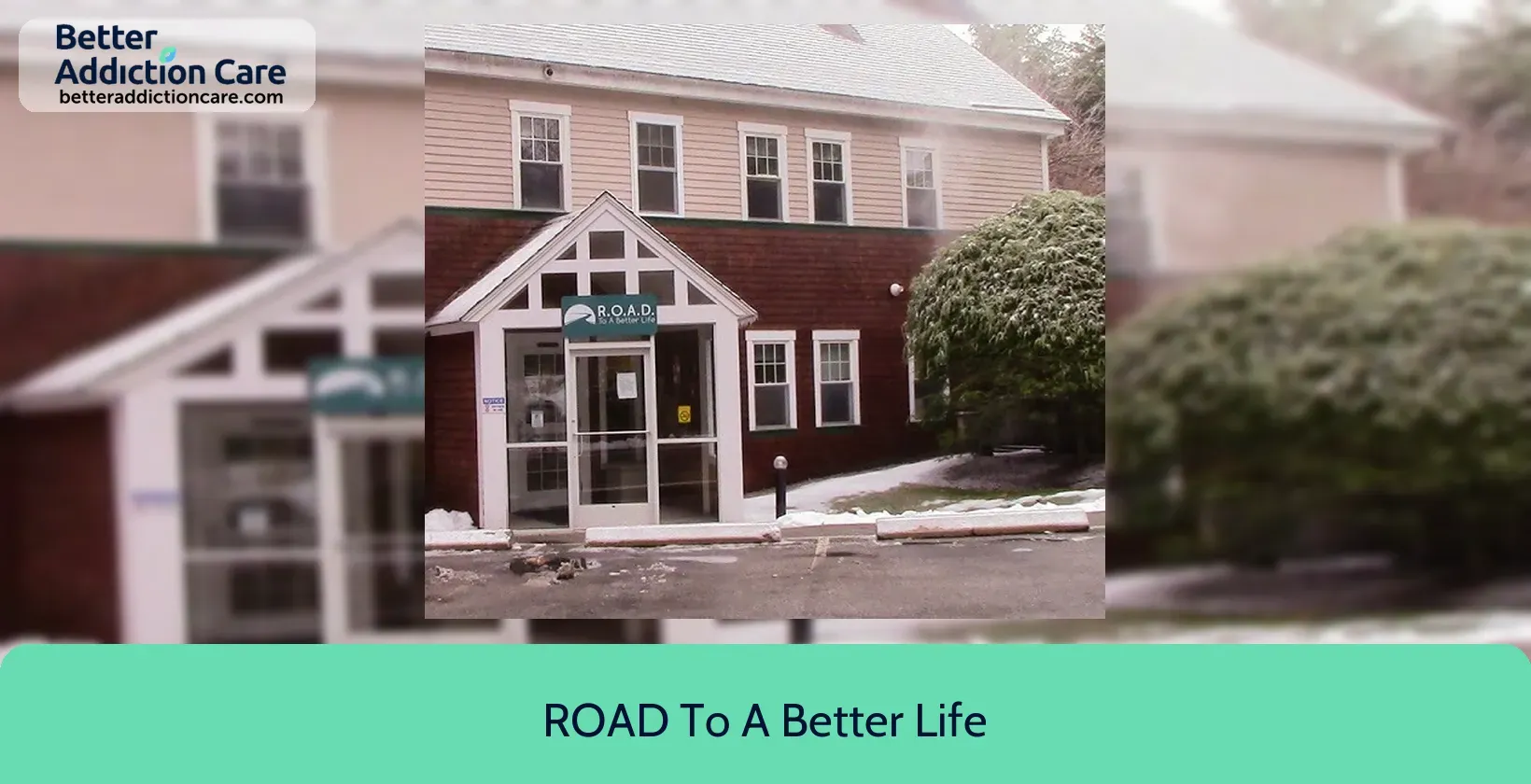
6.91
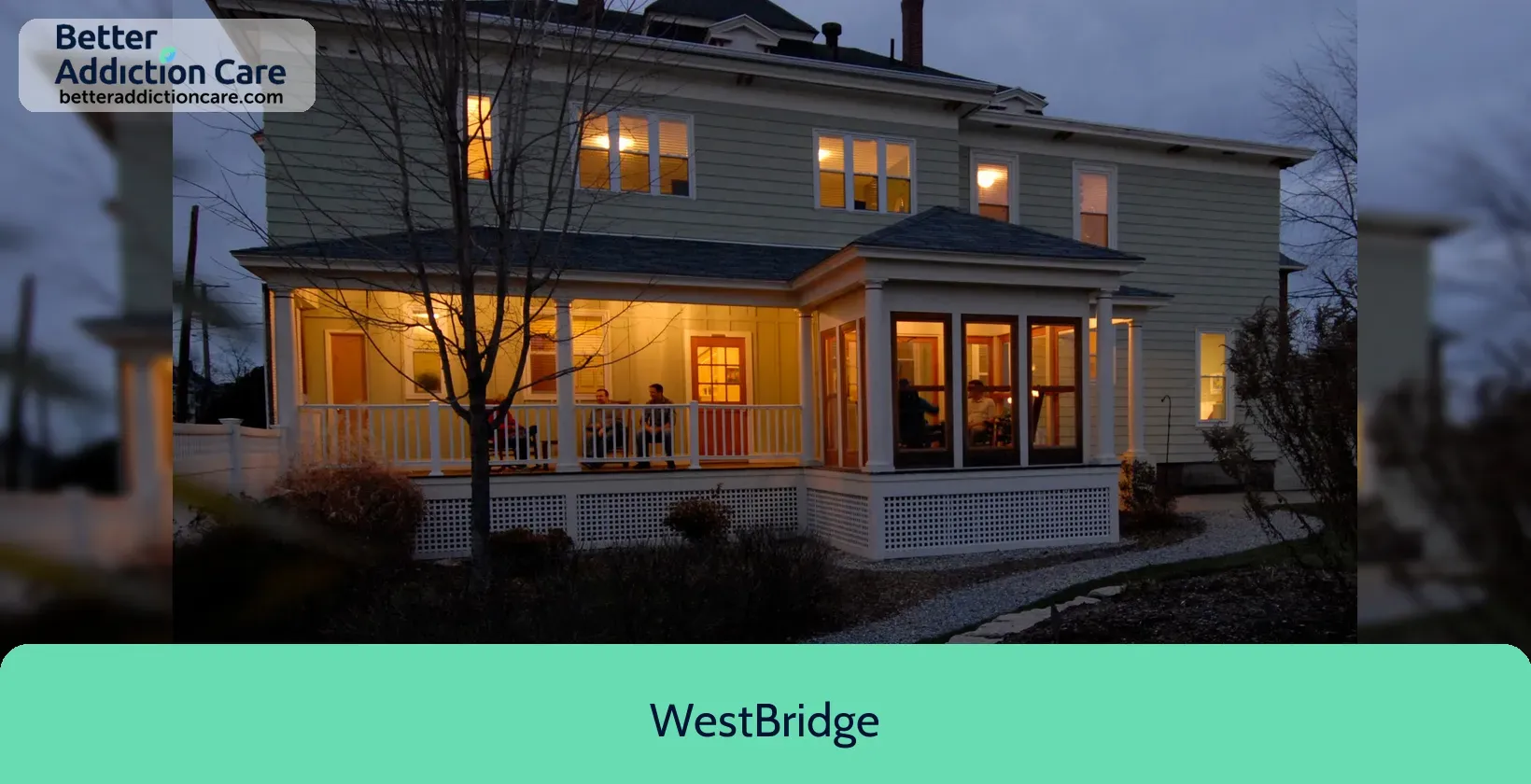
7.66
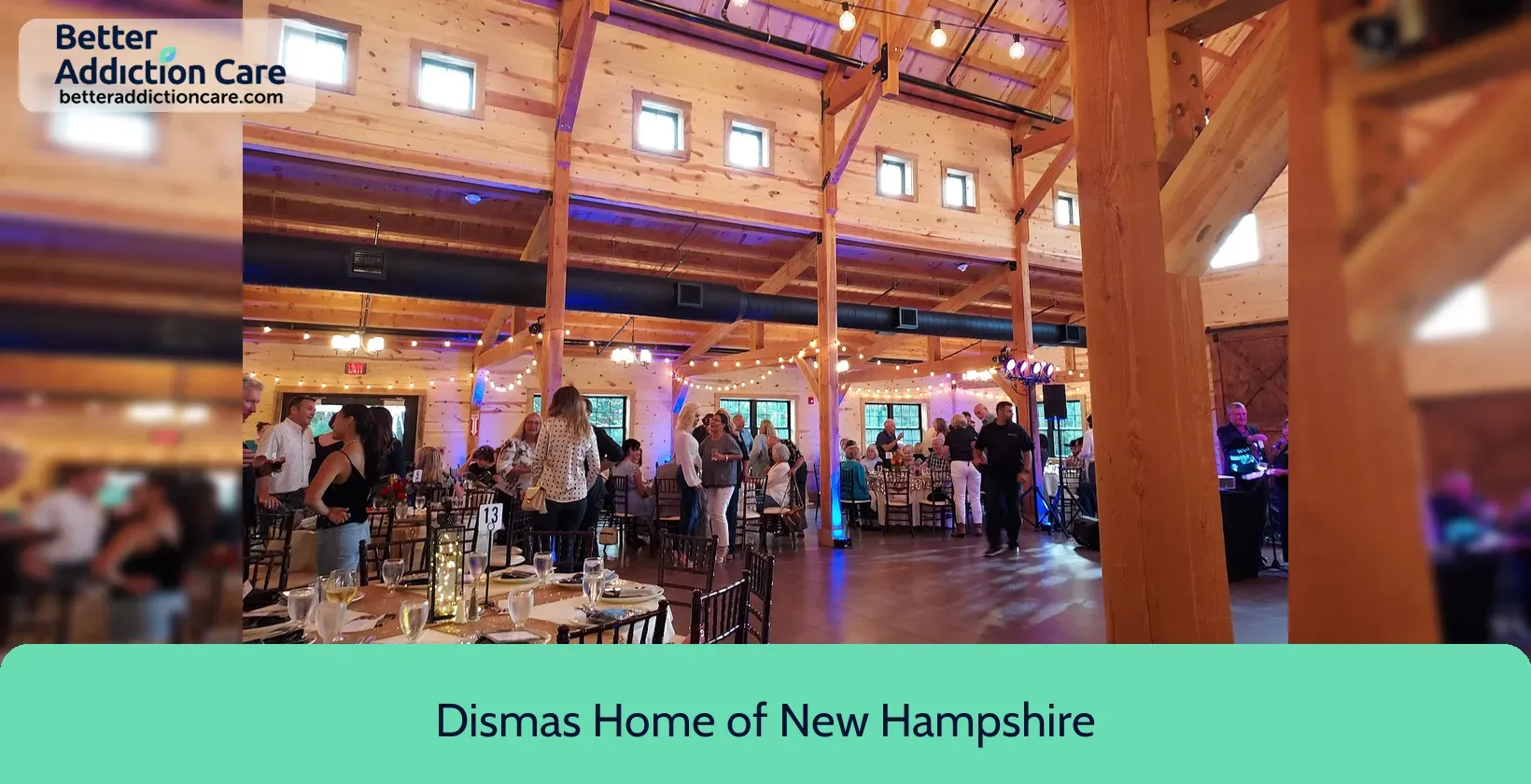
6.96
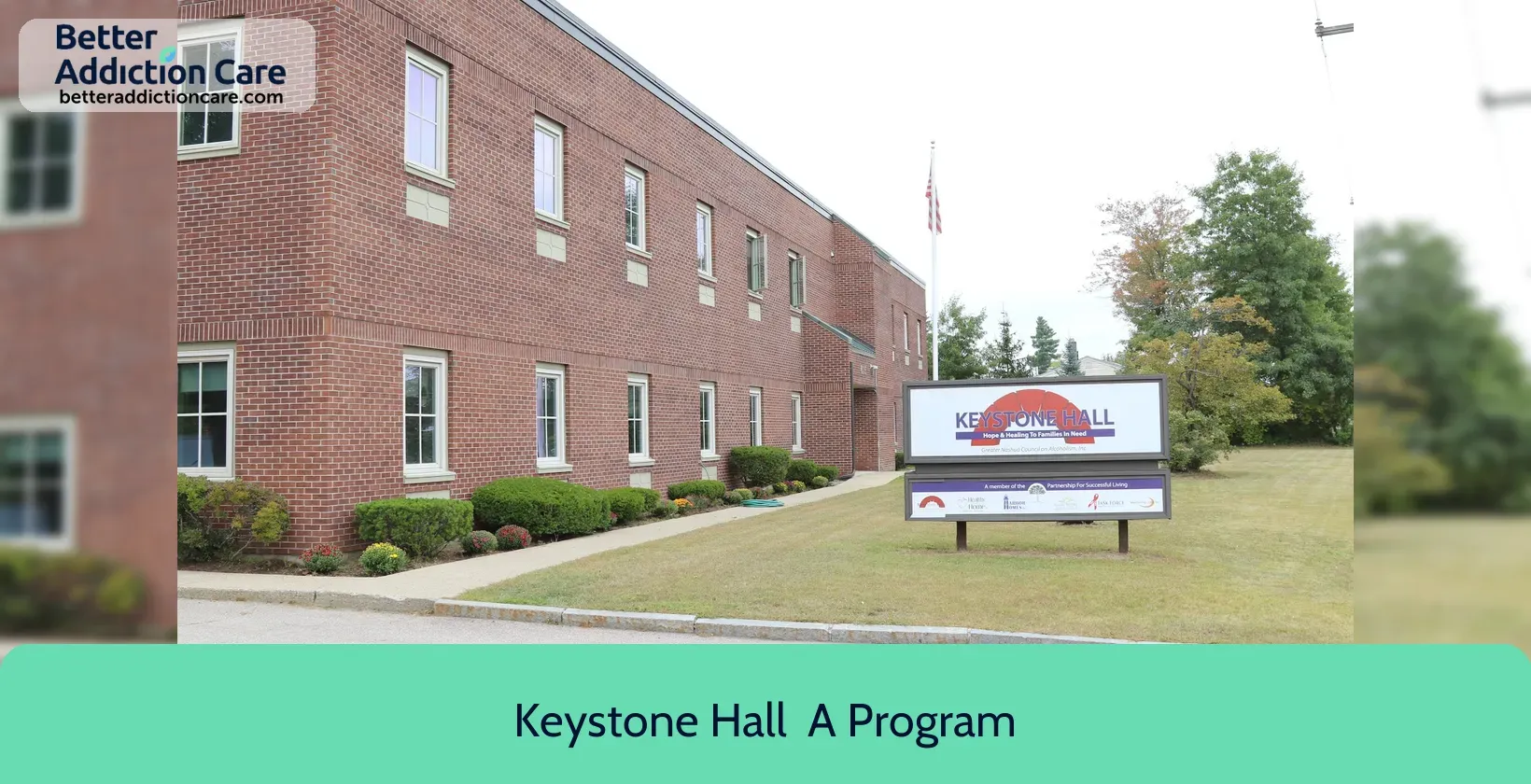
7.46
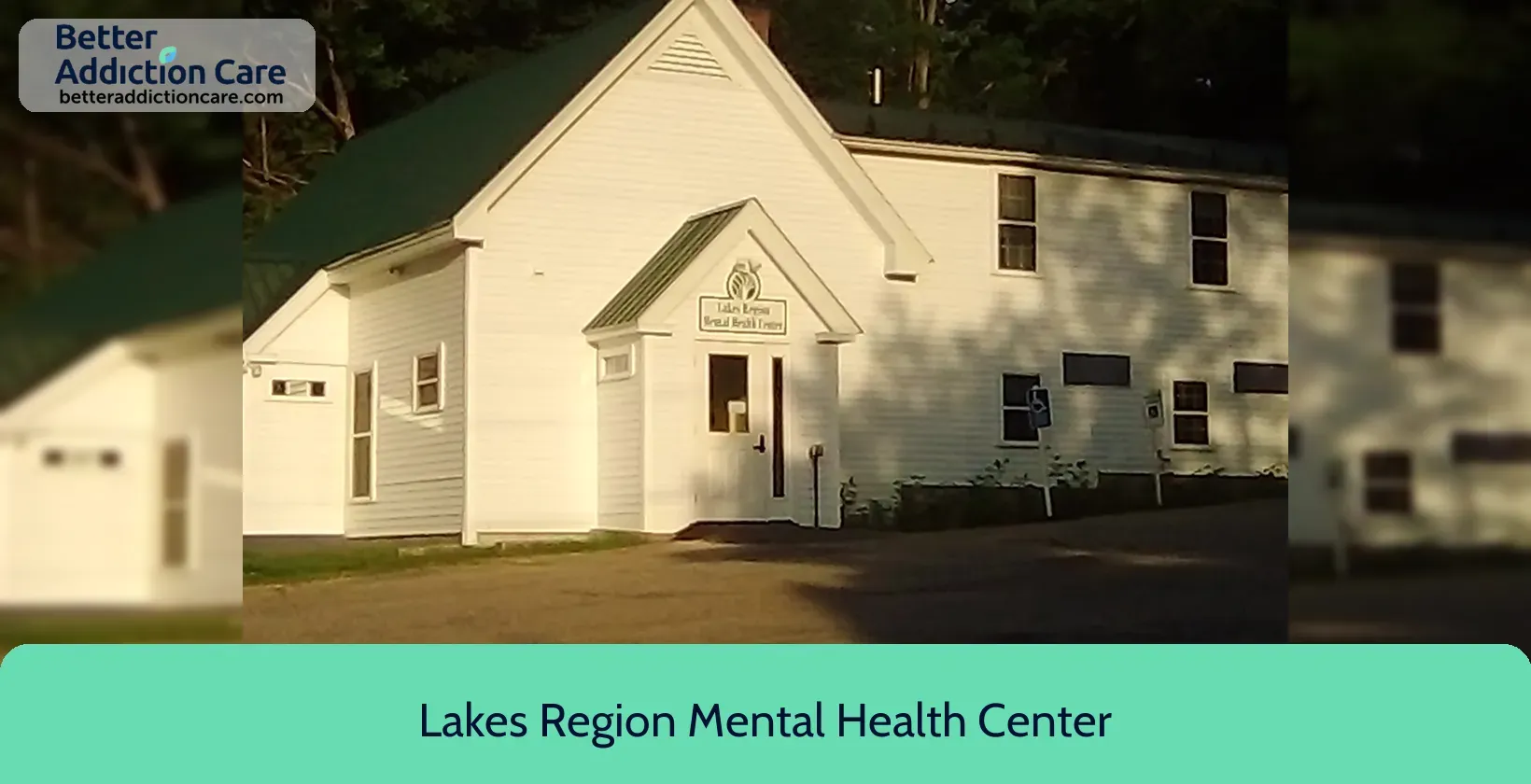
6.71
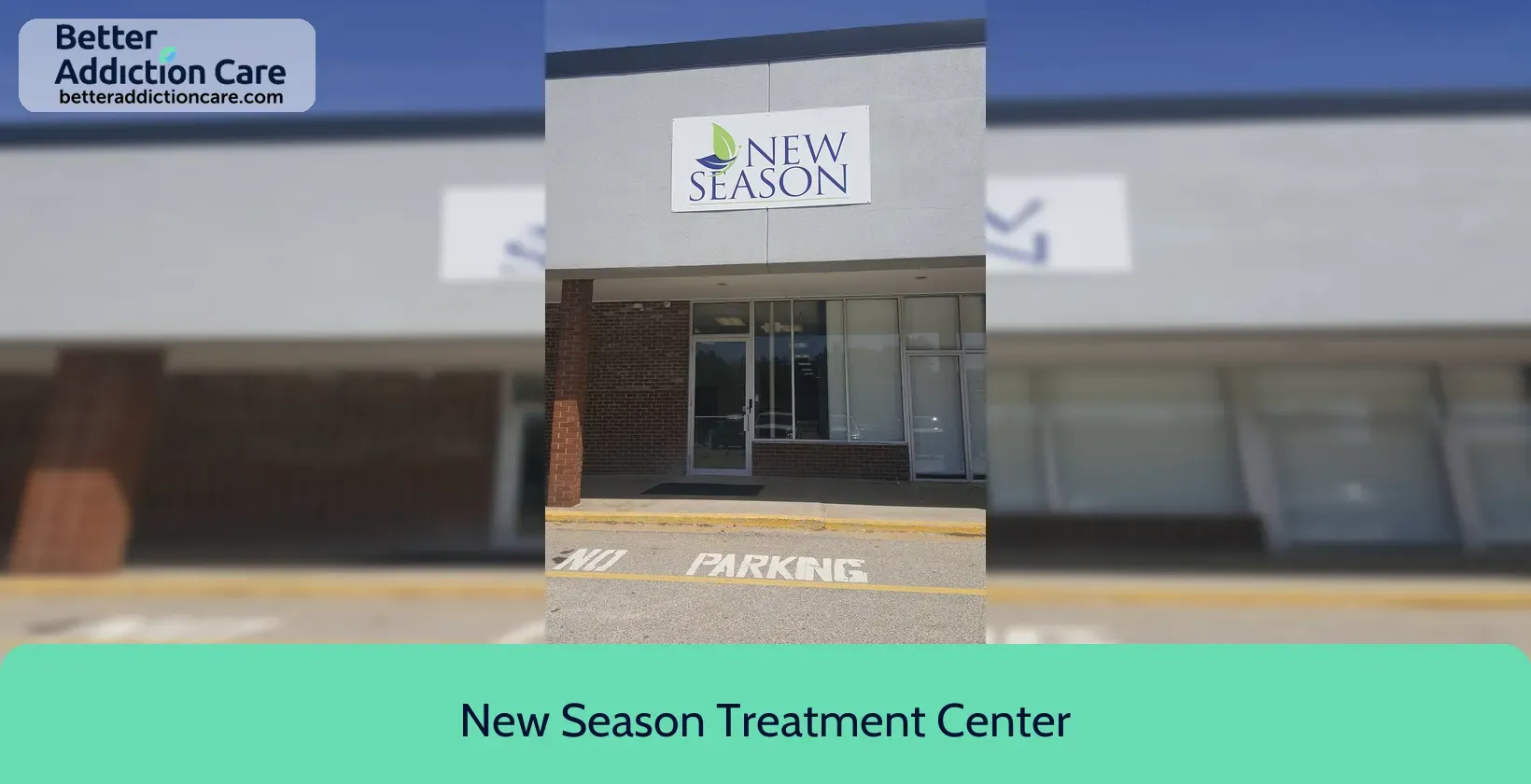
7.20
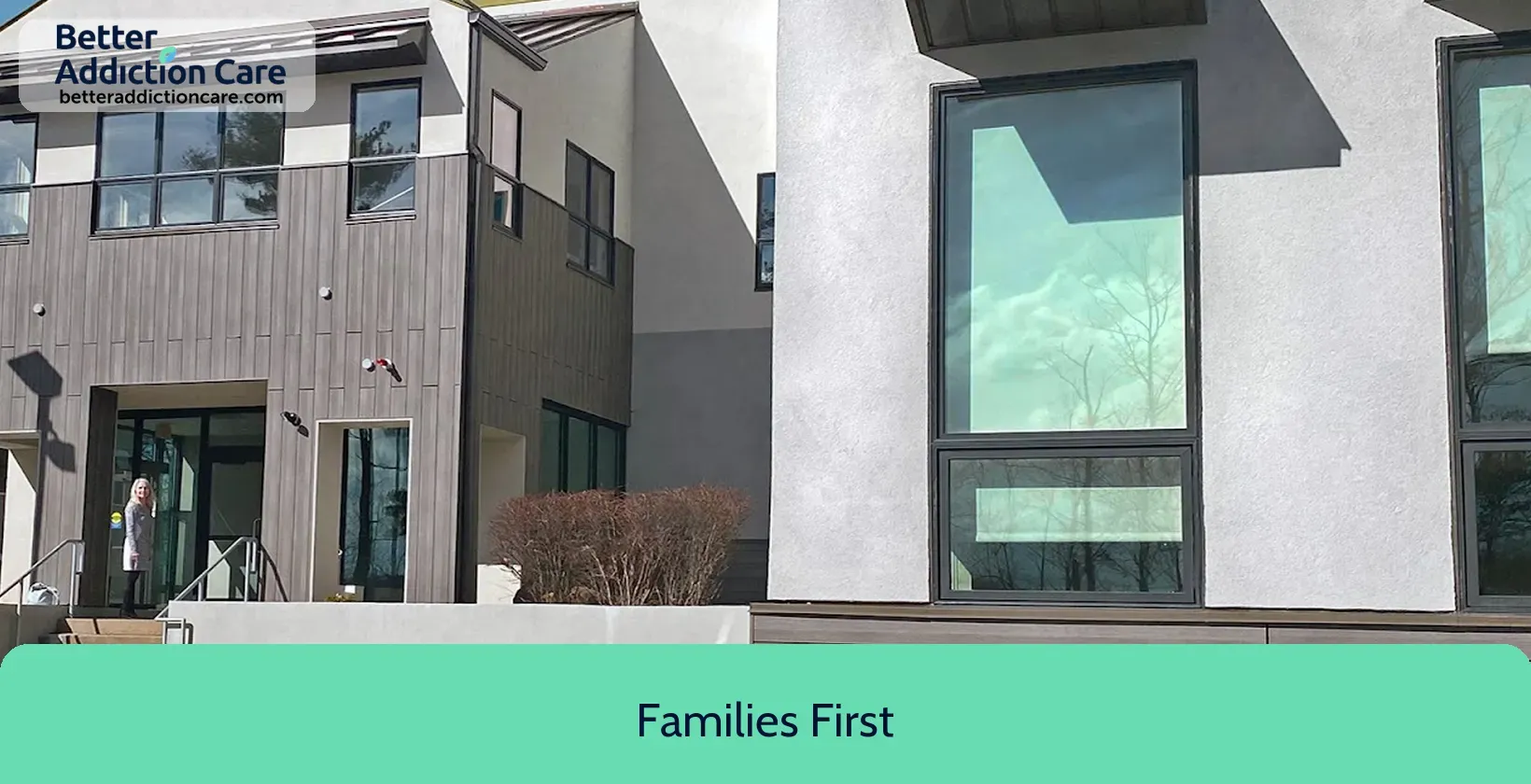
7.37
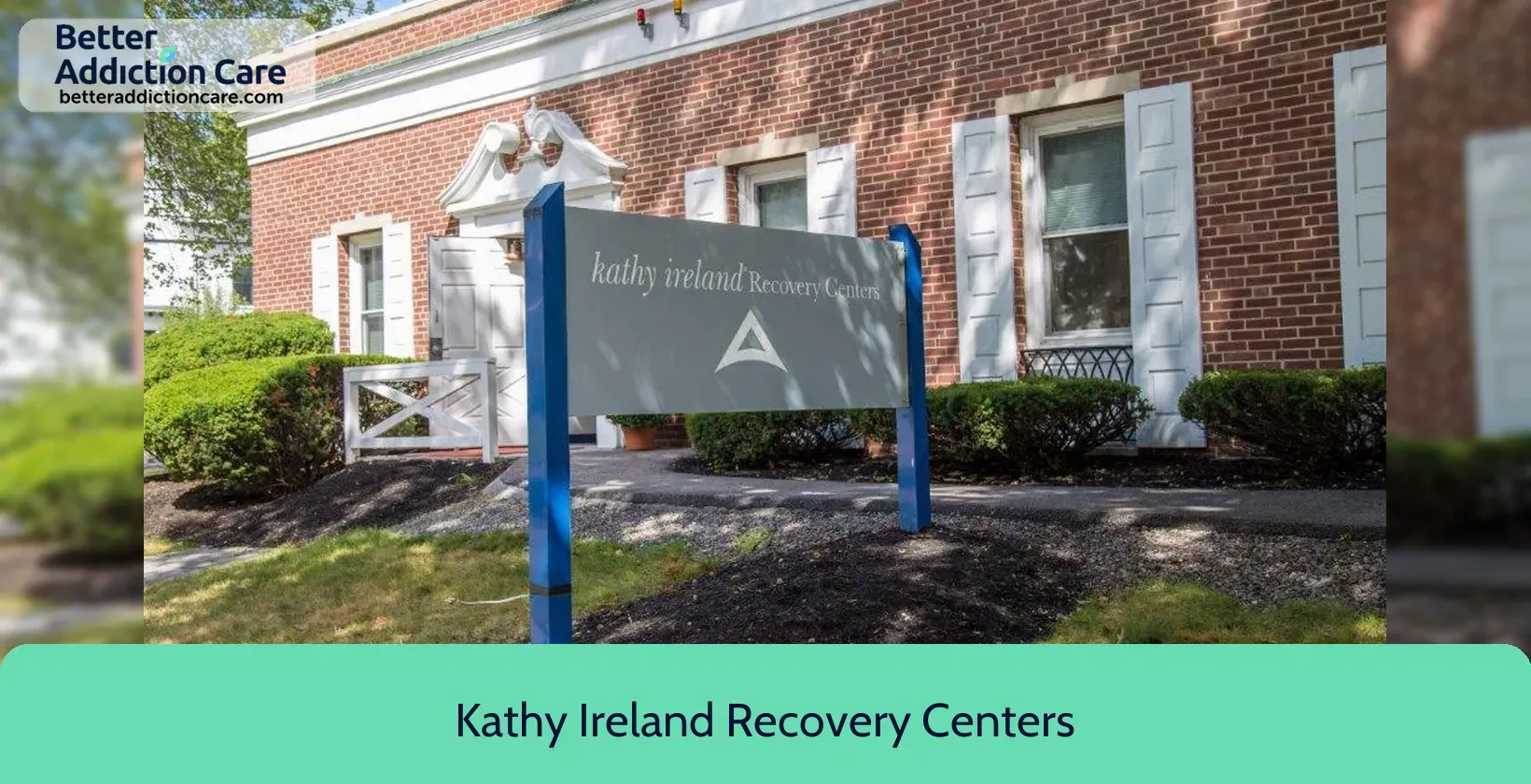
7.10
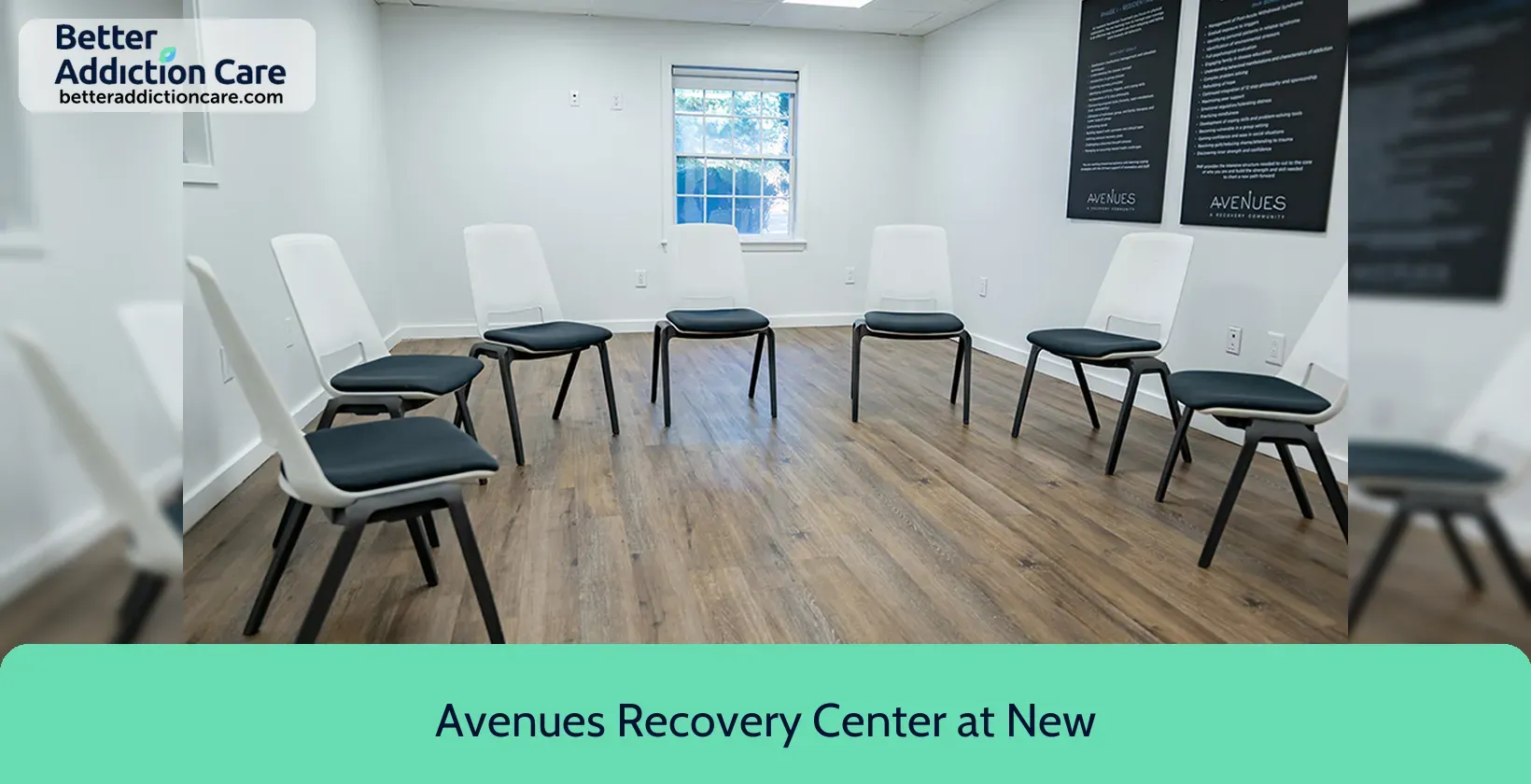
7.22
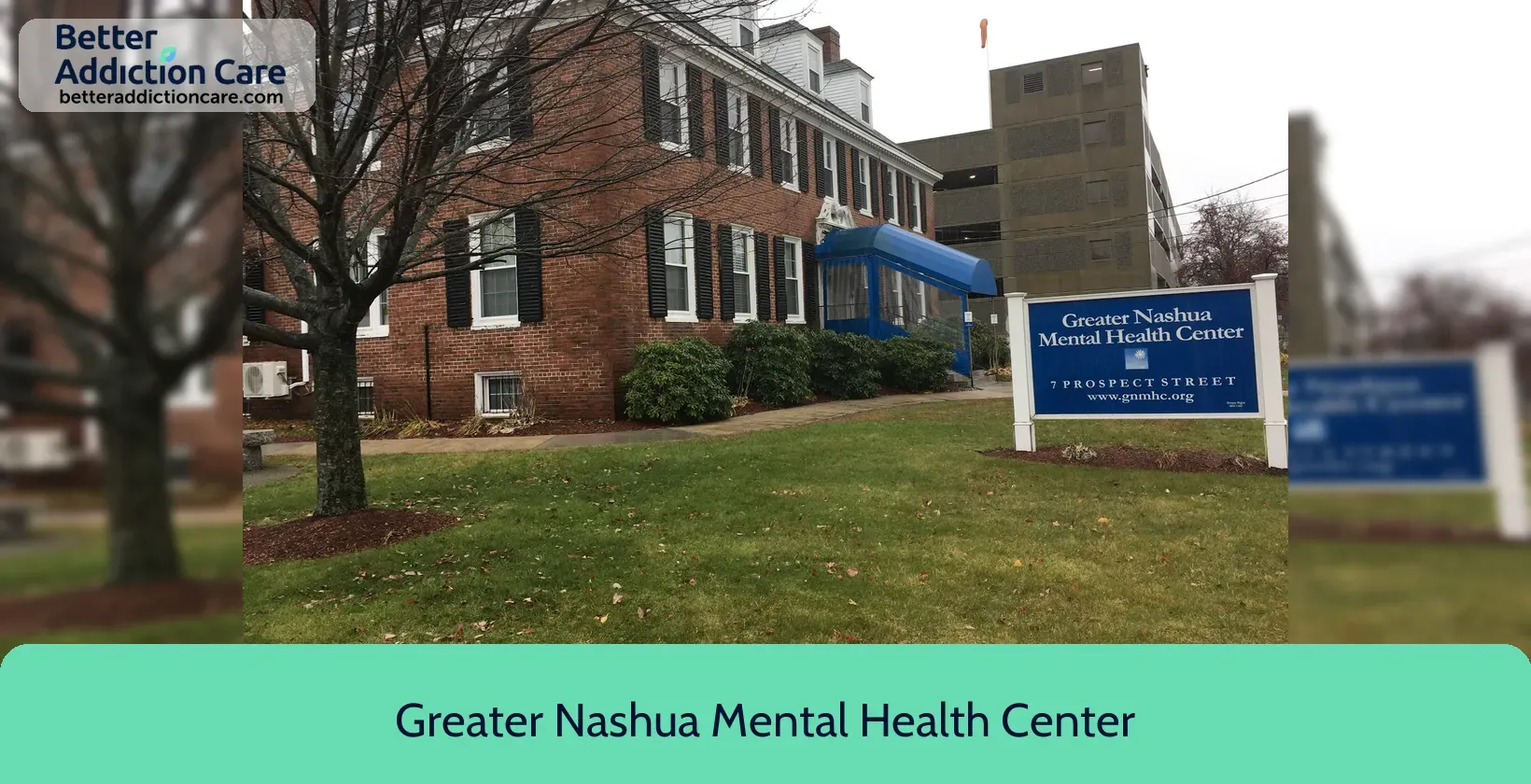
6.74
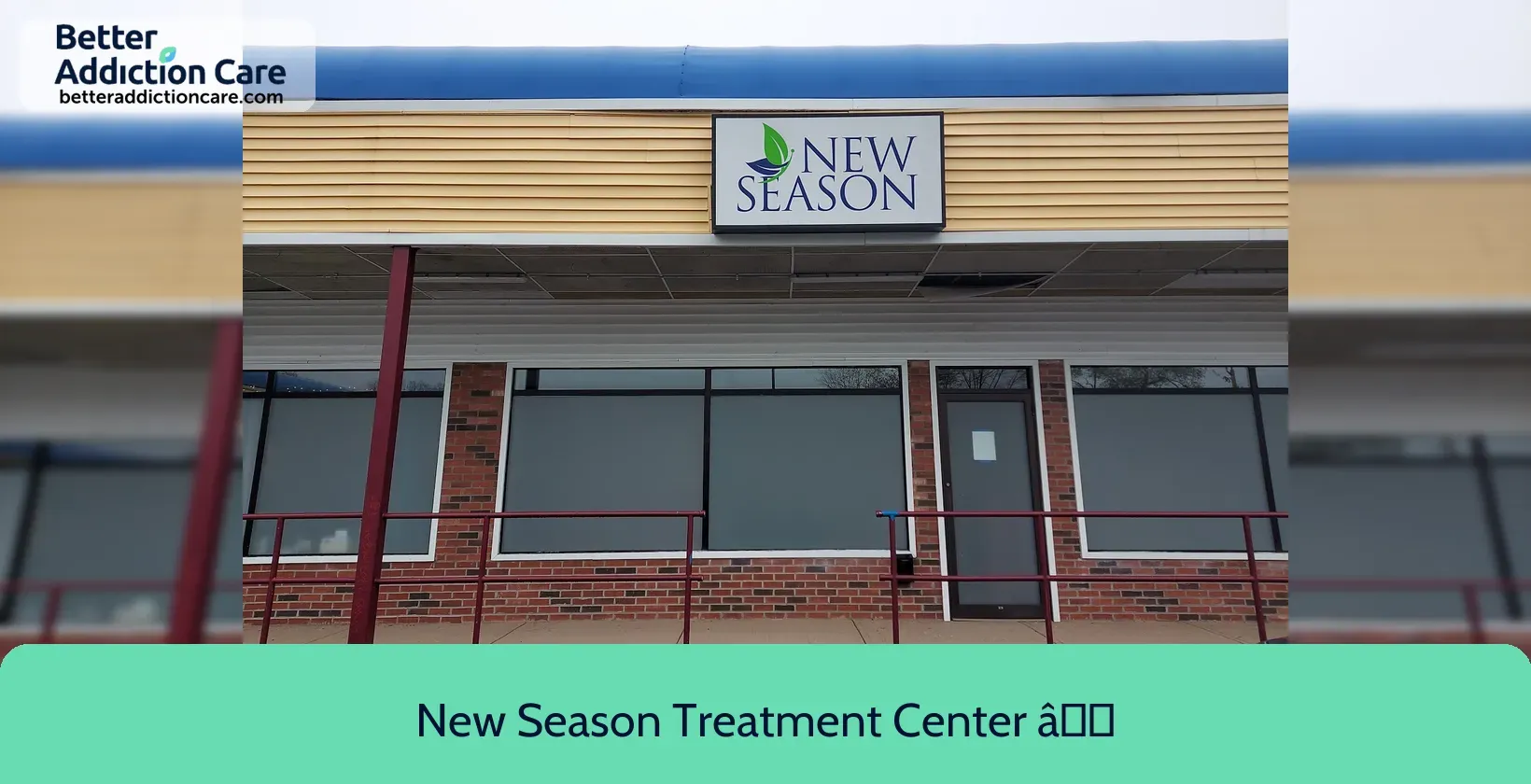
7.08
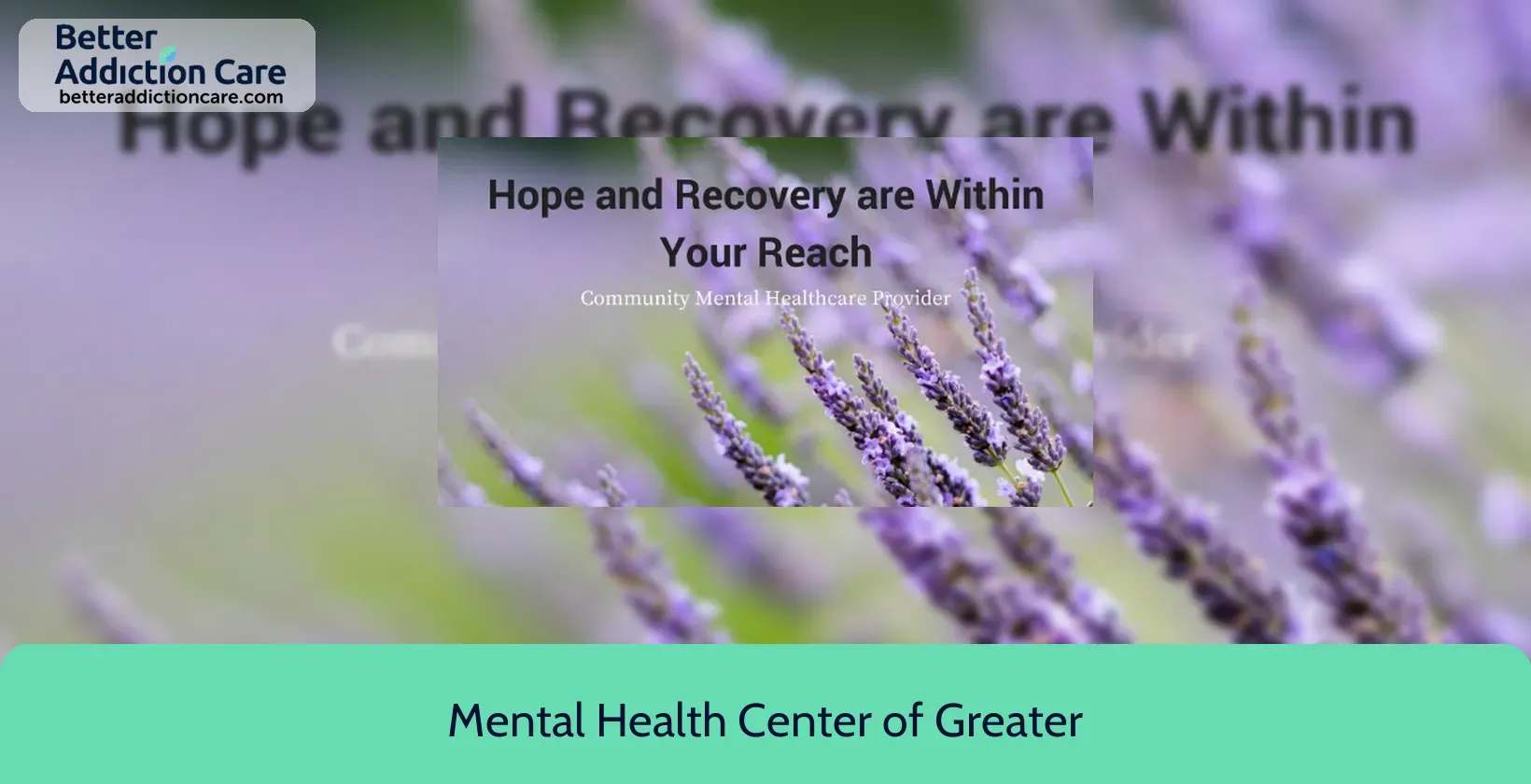
7.31
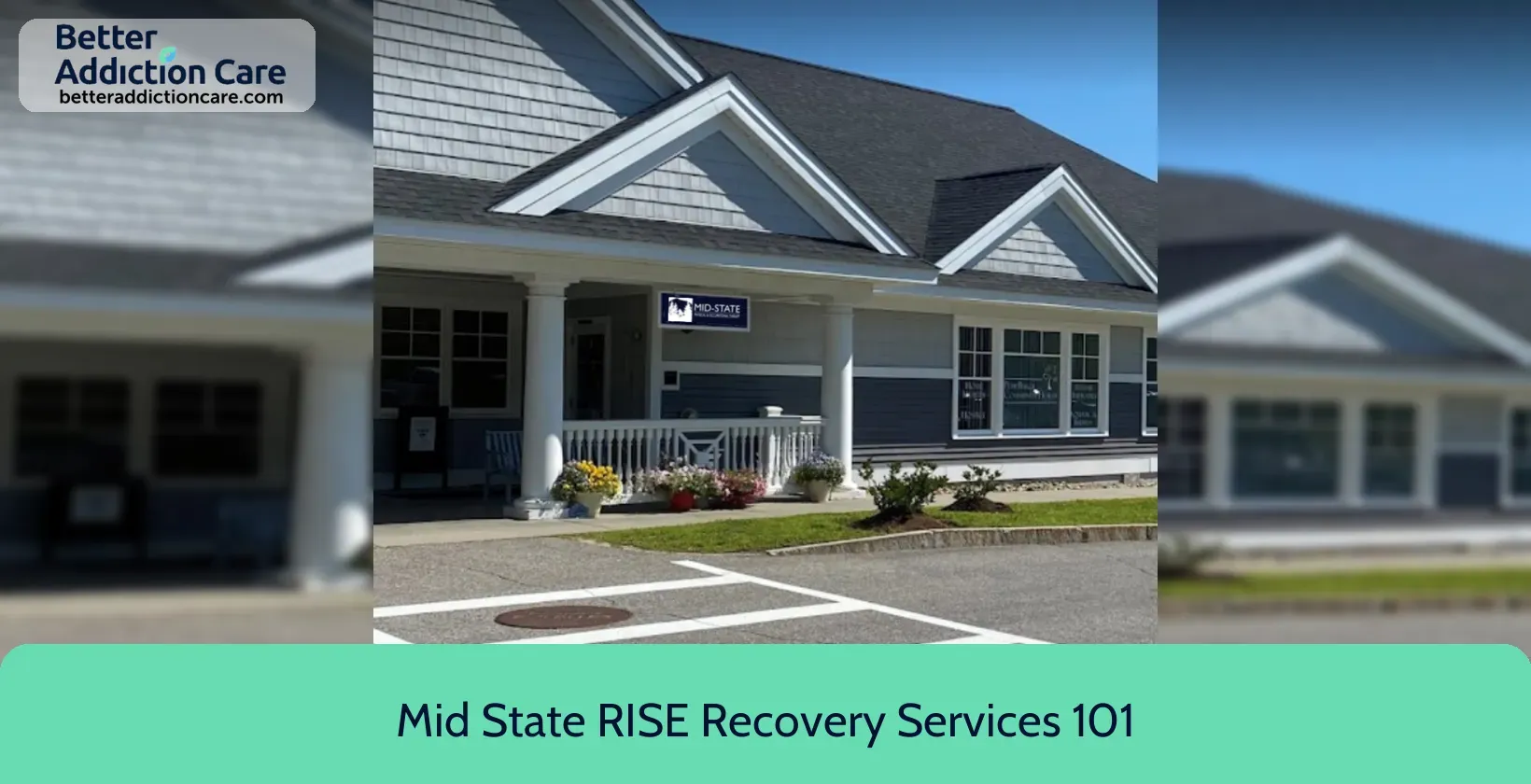
7.25
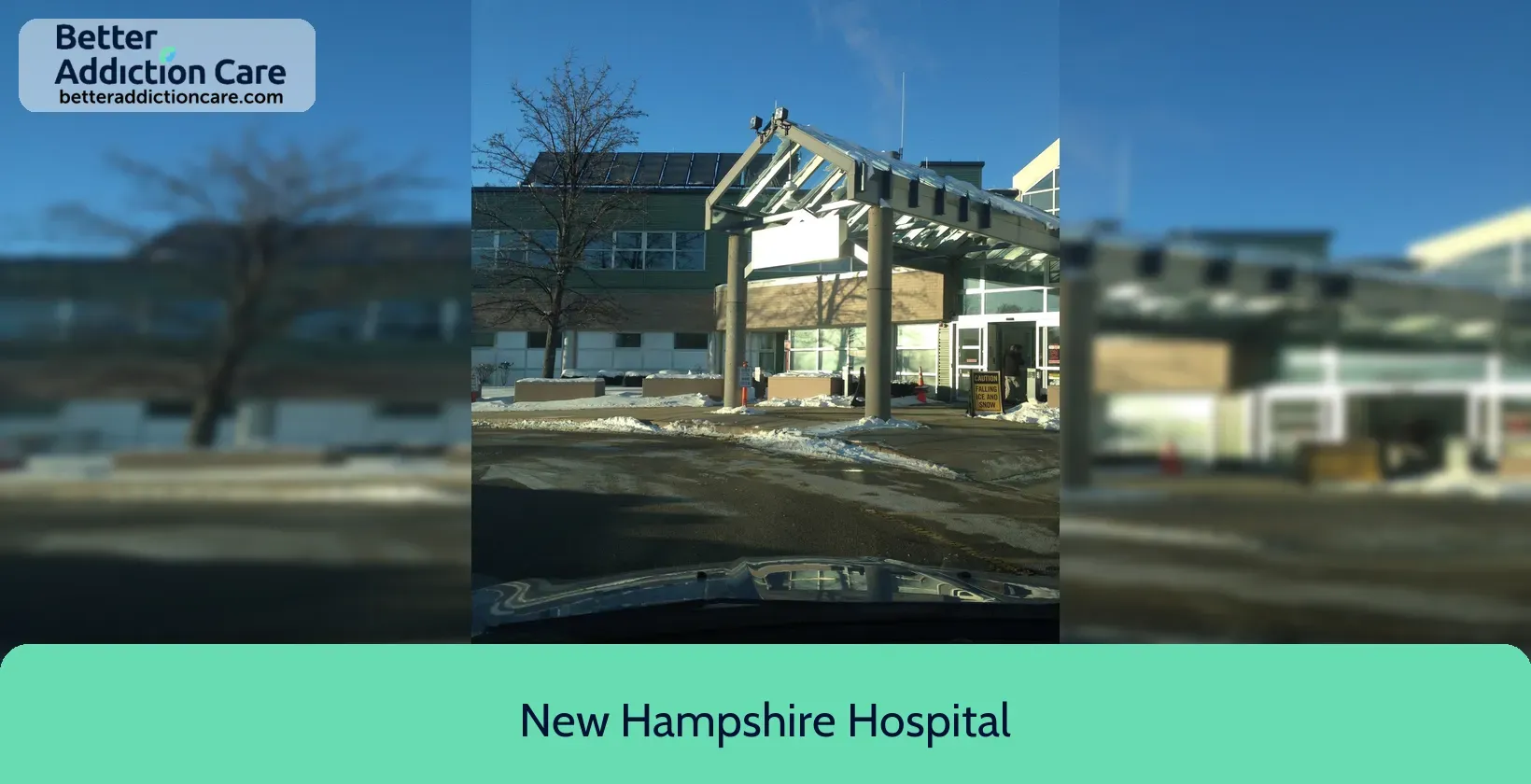
6.71
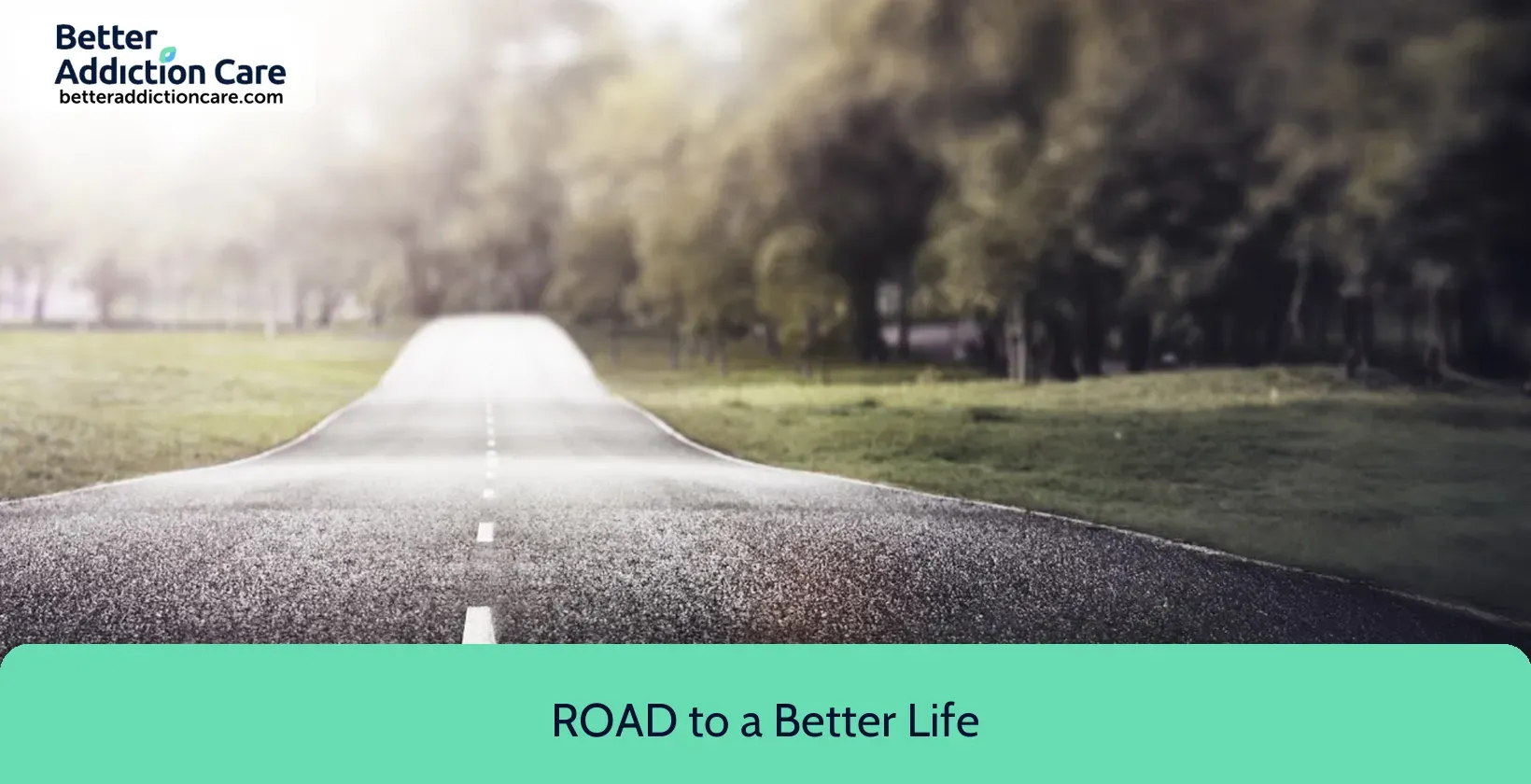
7.34
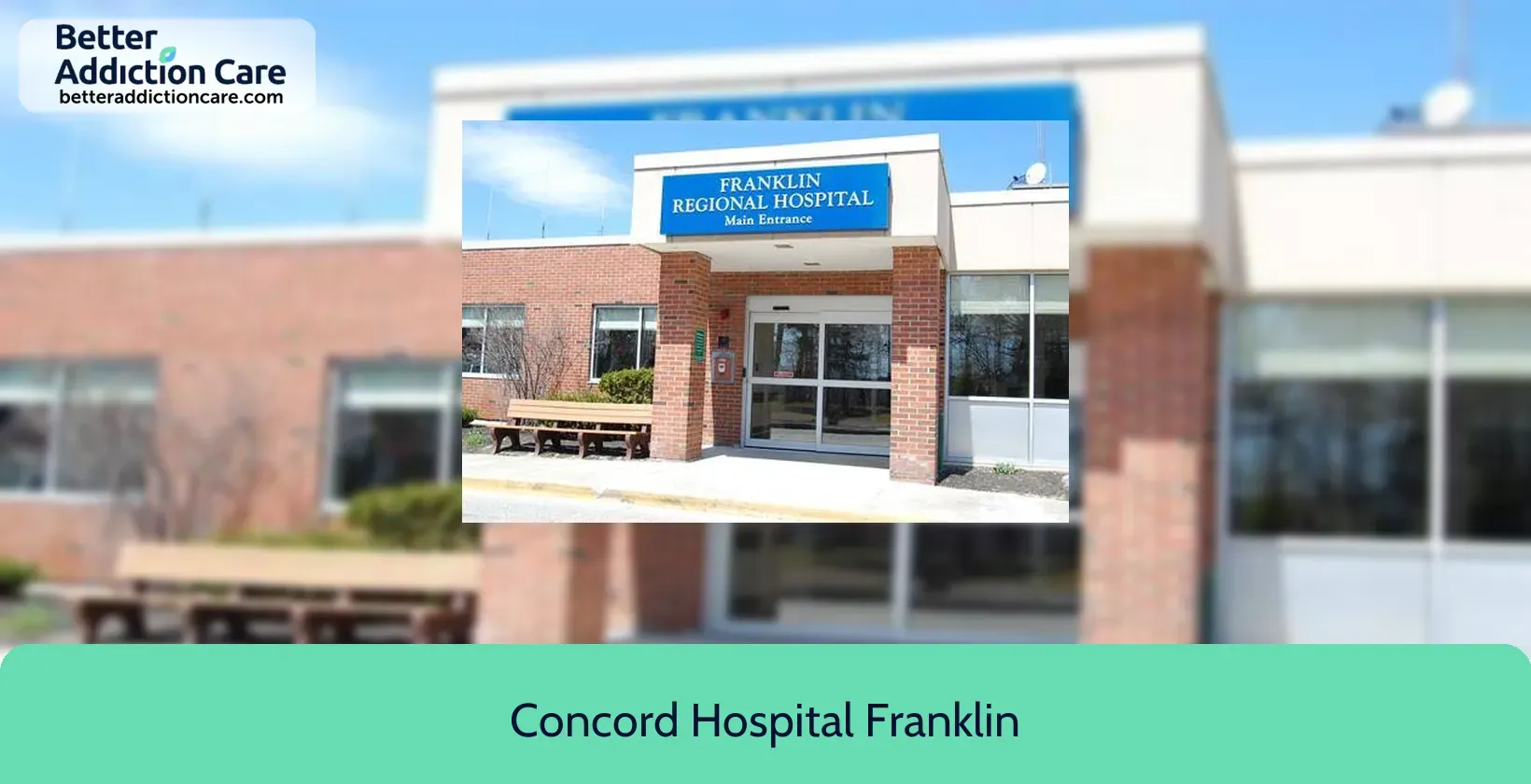
6.69

7.34

6.71
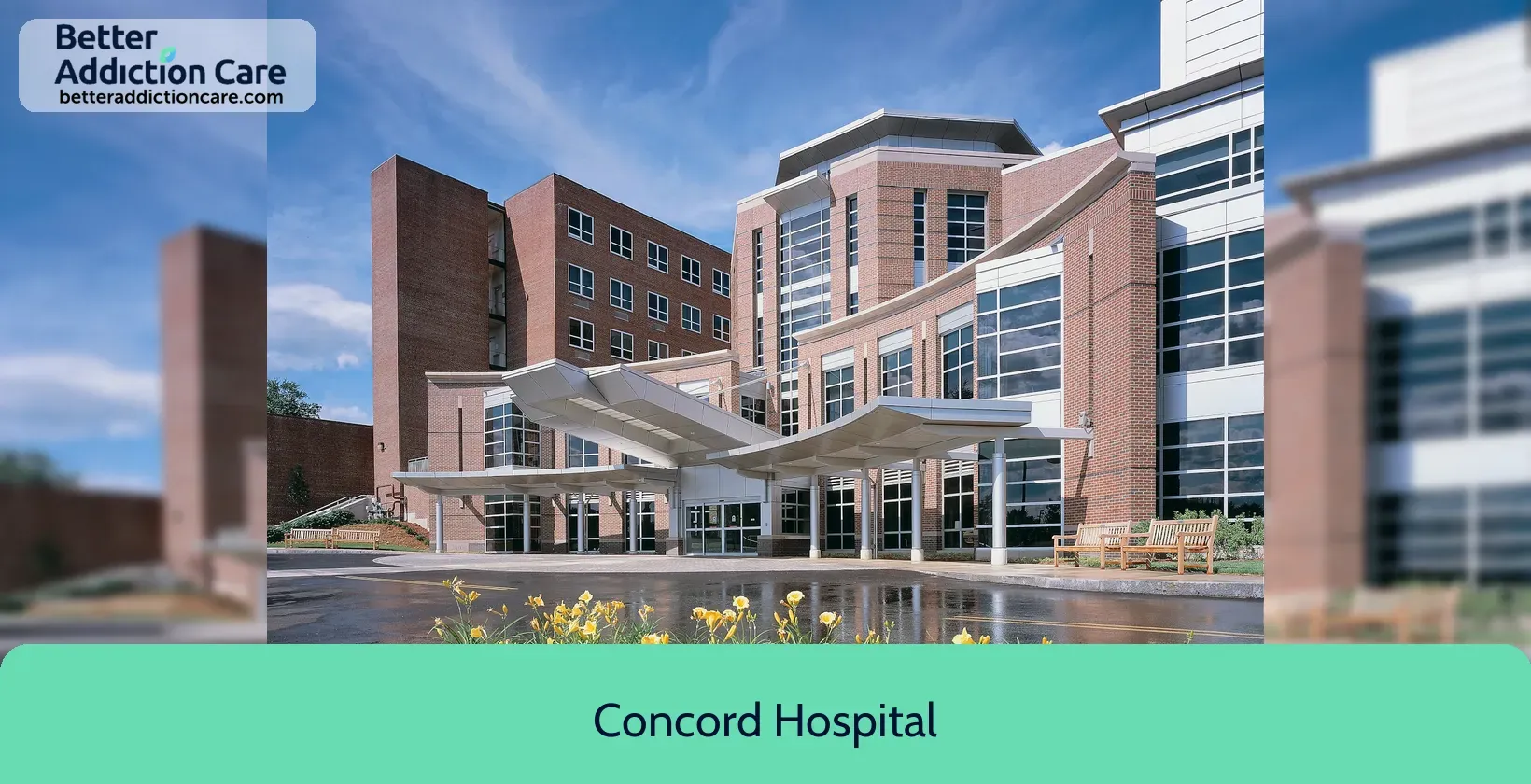
7.19

6.91

6.82

7.55

6.69

7.45

6.71

7.13

6.56

6.56

7.00

7.05

6.62

6.78

6.68

6.71

6.59

7.28

7.04

7.04

6.89

7.14

6.50
Local Rehabs in New Hampshire
Common Questions About Rehab in New Hampshire
Take a look at our FAQ. We've tried to fill it with all the answers you're looking for. And if not, contact us on (888) 349-0436.
Substance abuse and Mental Health facilities Report for New Hampshire
40th
Cheapest To Most Expensive State Rank
88
Substance Abuse Facilities
6,473
Number of Patients Annually
4,982
Annual Enrollments
$9M
Spent on Outpatient Services (Million)
$1,855.00
Avg Outpatient Rehab Cost
883
Residential Admissions
$51M
Spent on Residential Treatment (Million)
$58,777.00
Residential Rehab Pay (Up To)
3
Total Patients
1
Free Drug Rehab Facilities
Alcoholism, Drug Abuse, Mental Health, and Treatment in New Hampshire
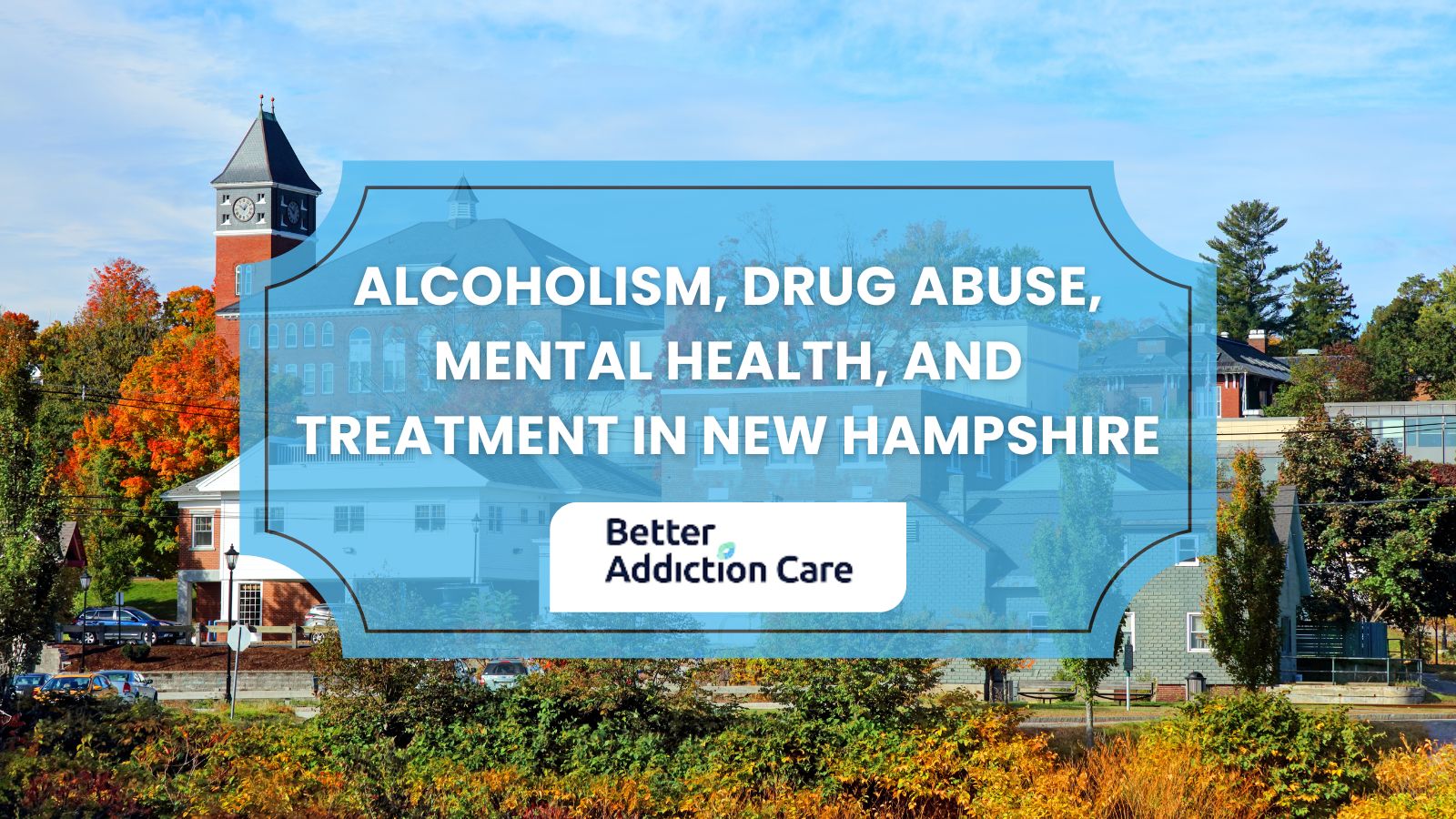
What are the main addictions people in New Hampshire suffer from?
The main addictions people in New Hampshire suffer from include
- Alcohol Addiction: 147,000 individuals aged 12 or older reported past-month alcohol use, which is 58.44% of New Hampshire's population. 85,000 males, representing 60% of those with AUD as compared to 62,000 females, representing 40% have alcohol addiction
- Marijuana Addiction: 225,000 individuals aged 12 or older reported past-year marijuana use, which is 18.49% of the population. 135,000 males, representing 60% of users, as compared to 90,000 females, representing 40% of users have marijuana addiction.
- Prescription Addiction: 35,000 individuals aged 12 or older reported past-year misuse of prescription pain relievers, which 2.86% of the population. 21,000 males, representing 60% of misusers, 14,000 females, representing 40% of misusers that have prescription addiction.
- Cocaine Addiction: 21,000 individuals aged 12 or older reported past-year cocaine use. 1.71% of the population. 13,000 male, representing 62% of users, 8,000 females, representing 38% of users have Cocaine addiction.
- Methamphetamine Addiction: 8,000 individuals aged 12 or older reported past-year methamphetamine use, which is 0.62% of the population. 5,000 males, representing 62% of users as compared to 3,000 females, representing 38% of users have Methamphetamine Addiction
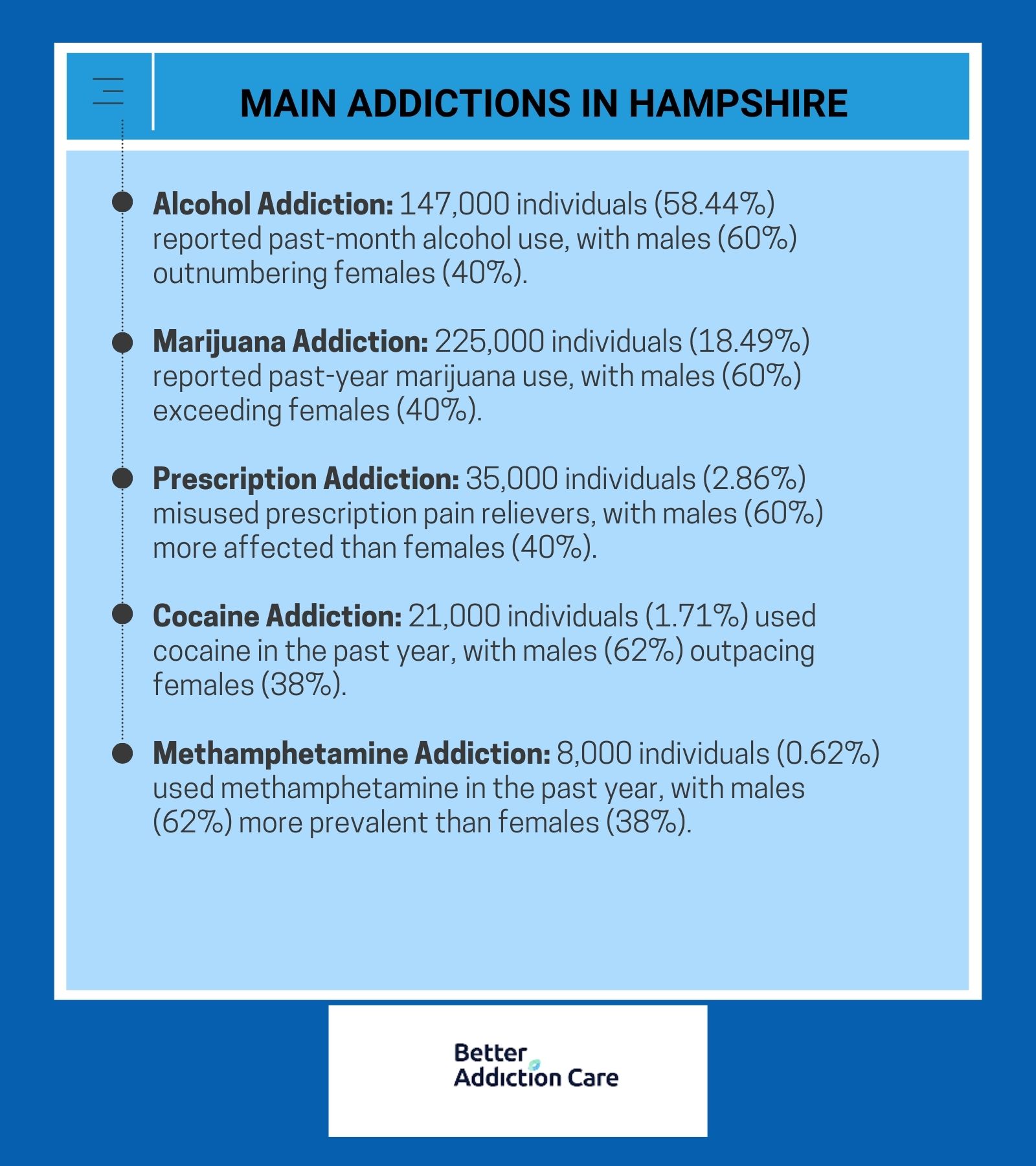
What is the cost of rehab centers in New Hampshire?
The cost of rehab centers in New Hampshire is $58,777. Long-term inpatient programs, which last 60–90 days, average $51,867, 11.7% less than the standard cost. Outpatient programs, on the other hand, are significantly more affordable, averaging $8,618, which is 85.3% less than the average.
The cost of rehab centers in New Hampshire vary significantly based on the type of addiction and treatment required. For instance, medical detoxification, often necessary for alcohol or opioid addiction, cost $144,907, representing a 146.5% increase over the average treatment cost.
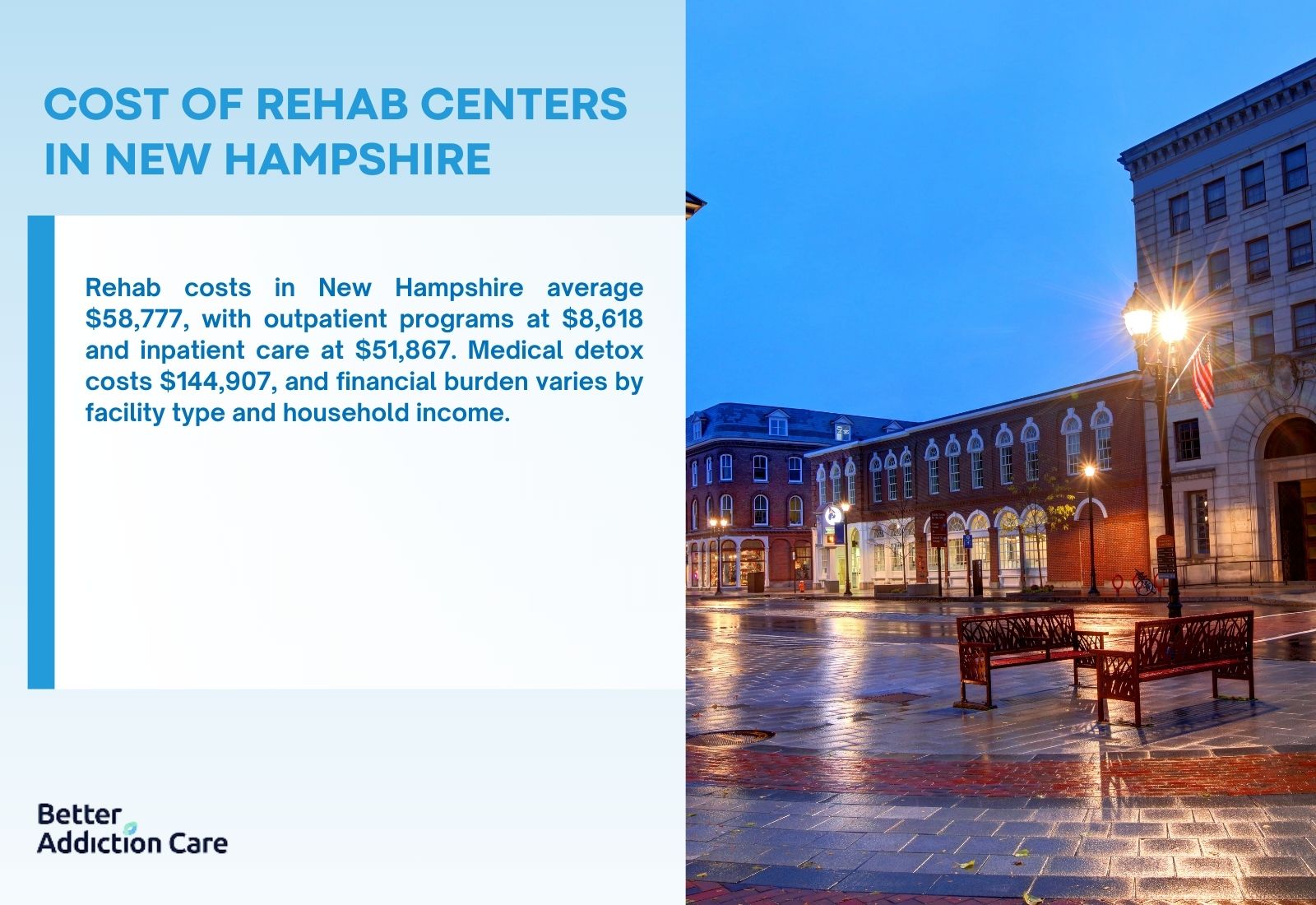
The median household income in New Hampshire is $96,838 in 2024, the cost of rehab centers $58,777 consumes 60.7% of a household's annual income, highlighting the financial burden for many families. Costs of rehab centers also vary depending on the type of rehab center. Luxury or private facilities tend to charge more due to enhanced amenities, whereas state-funded or non-profit centers often provide more affordable options.
What is the cost of LGBTQ+ rehab centers in New Hampshire?
The cost of LGBTQ+ rehab centers in New Hampshire is $57,000. Long-term inpatient programs, which last 60–90 days, average $51,867, about 11.7% less than the standard cost. Outpatient programs, on the other hand, are significantly more affordable, averaging $8,618, which is 85.3% less than the average.
The cost of LGBTQ+ rehab centers in New Hampshire vary significantly based on the type of addiction and treatment required. For instance, medical detoxification, often necessary for alcohol or opioid addiction, cost $144,907, representing a 146.5% increase over the average treatment cost.
The median household income in New Hampshire is $96,838 in 2024, the cost of LGBTQ+ rehab centers $57,000 consumes 58.8% of a household's annual income, highlighting the financial burden for many families. Costs of LGBTQ+ rehab centers also vary depending on the type of rehab center. Luxury or private facilities tend to charge more due to enhanced amenities, whereas state-funded or non-profit centers often provide more affordable options.
What is the cost of Faith-Based rehab centers in New Hampshire?
The cost of Faith-Based rehab centers in New Hampshire is $56,870. Long-term inpatient programs, which last 60–90 days, average $51,867, 11.7% less than the standard cost. Outpatient programs, on the other hand, are significantly more affordable, averaging $8,618, which is 85.3% less than the average.
The cost of Faith-Based rehab centers in New Hampshire vary significantly based on the type of addiction and treatment required. For instance, medical detoxification, often necessary for alcohol or opioid addiction, cost $144,907, representing a 146.5% increase over the average treatment cost.
The median household income in New Hampshire is $96,838 in 2024, the cost of Faith-Based rehab centers $56,870 consumes 58.7% of a household's annual income, highlighting the financial burden for many families. Costs of Faith-Based rehab centers also vary depending on the type of rehab center. Luxury or private facilities tend to charge more due to enhanced amenities, whereas state-funded or non-profit centers often provide more affordable options.
What is the cost of Men-Only rehab centers in New Hampshire?
The cost of Men-Only rehab centers in New Hampshire is $58,000. Long-term inpatient programs, which last 60–90 days, average $51,867, about 11.7% less than the standard cost. Outpatient programs, on the other hand, are significantly more affordable, averaging $8,618, which is 85.3% less than the average.
The cost of Men-Only rehab centers in New Hampshire vary significantly based on the type of addiction and treatment required. For instance, medical detoxification, often necessary for alcohol or opioid addiction, cost $144,907, representing a 146.5% increase over the average treatment cost.
The median household income in New Hampshire is $96,838 in 2024, the cost of Men-Only rehab centers $58,000 consumes 60% of a household's annual income, highlighting the financial burden for many families. Costs of Men-Only rehab centers also vary depending on the type of rehab center. Luxury or private facilities tend to charge more due to enhanced amenities, whereas state-funded or non-profit centers often provide more affordable options.
What is the cost of Women-Only rehab centers in New Hampshire?
The cost of Women-Only rehab centers in New Hampshire is $55,500. Long-term inpatient programs, which last 60–90 days, average $51,867, about 11.7% less than the standard cost. Outpatient programs, on the other hand, are significantly more affordable, averaging $8,618, which is 85.3% less than the average.
The cost of Women-Only rehab centers in New Hampshire vary significantly based on the type of addiction and treatment required. For instance, medical detoxification, often necessary for alcohol or opioid addiction, cost $144,907, representing a 146.5% increase over the average treatment cost.
The median household income in New Hampshire is $96,838 in 2024, the cost of Women-Only rehab centers $55,500 consumes 57% of a household's annual income, highlighting the financial burden for many families. Costs of Women-Only rehab centers also vary depending on the type of rehab center. Luxury or private facilities tend to charge more due to enhanced amenities, whereas state-funded or non-profit centers often provide more affordable options.
What is the cost of Teen rehab centers in New Hampshire?
The cost of Teen rehab centers in New Hampshire is $54,900. Long-term inpatient programs, which last 60–90 days, average $51,867, about 11.7% less than the standard cost. Outpatient programs, on the other hand, are significantly more affordable, averaging $8,618, which is 85.3% less than the average.
The cost of Teen rehab centers in New Hampshire vary significantly based on the type of addiction and treatment required. For instance, medical detoxification, often necessary for alcohol or opioid addiction, cost $144,907, representing a 146.5% increase over the average treatment cost.
The median household income in New Hampshire is $96,838 in 2024, the cost of Teen rehab centers $54,900 consumes 56% of a household's annual income, highlighting the financial burden for many families. Costs of Teen rehab centers also vary depending on the type of rehab center. Luxury or private facilities tend to charge more due to enhanced amenities, whereas state-funded or non-profit centers often provide more affordable options.
What is the cost of Young Adult rehab centers in New Hampshire?
The cost of Young Adult rehab centers in New Hampshire is $52,890. Long-term inpatient programs, which last 60–90 days, average $51,867, about 11.7% less than the standard cost. Outpatient programs, on the other hand, are significantly more affordable, averaging $8,618, which is 85.3% less than the average.
The cost of Young Adult rehab centers in New Hampshire vary significantly based on the type of addiction and treatment required. For instance, medical detoxification, often necessary for alcohol or opioid addiction, cost $144,907, representing a 146.5% increase over the average treatment cost.
The median household income in New Hampshire is $96,838 in 2024, the cost of Young Adult rehab centers $52,890 consumes 54% of a household's annual income, highlighting the financial burden for many families. Costs of Young Adult rehab centers also vary depending on the type of rehab center. Luxury or private facilities tend to charge more due to enhanced amenities, whereas state-funded or non-profit centers often provide more affordable options.
What is the cost of Luxury Rehab centers in New Hampshire?
The cost of Luxury rehab centers in New Hampshire is $100,000. Long-term inpatient programs, which last 60–90 days, average $80,000. Outpatient programs, on the other hand, are significantly more affordable, averaging $8,618.
The cost of Luxury rehab centers in New Hampshire vary significantly based on the type of addiction and treatment required. For instance, medical detoxification, often necessary for alcohol or opioid addiction, cost around $144,907, representing a 146.5% increase over the average treatment cost.
The median household income in New Hampshire is $96,838 in 2024, the cost of Luxury rehab centers $100,000 consumes 103% of a household's annual income, highlighting the financial burden for many families. Costs of Luxury rehab centers also vary depending on the type of rehab center. Luxury or private facilities tend to charge more due to enhanced amenities, whereas state-funded or non-profit centers often provide more affordable options.
What is the cost of Dual Diagnosis rehab centers in New Hampshire?
The cost of Dual Diagnosis rehab centers in New Hampshire is $54,900. Long-term inpatient programs, which last 60–90 days, average $51,867, about 11.7% less than the standard cost. Outpatient programs, on the other hand, are significantly more affordable, averaging $8,618, which is 85.3% less than the average.
The cost of Dual Diagnosis rehab centers in New Hampshire vary significantly based on the type of addiction and treatment required. For instance, medical detoxification, often necessary for alcohol or opioid addiction, cost around $144,907, representing a 146.5% increase over the average treatment cost.
The median household income in New Hampshire is $96,838 in 2024, the cost of Dual Diagnosis rehab centers $54,900 consumes 56% of a household's annual income, highlighting the financial burden for many families. Costs of Dual Diagnosis rehab centers also vary depending on the type of rehab center. Luxury or private facilities tend to charge more due to enhanced amenities, whereas state-funded or non-profit centers often provide more affordable options.
Is drug abuse and addiction a problem in New Hampshire?
Yes, drug abuse and addiction is a problem in New Hampshire. One major reason is the New Hampshire ongoing struggle with the opioid crisis, which has led to consistently high rates of overdose deaths. In 2024 alone, New Hampshire recorded over 430 opioid-related fatalities, reflecting a steady increase compared to previous years. Another contributing factor is the accessibility of drugs such as fentanyl and methamphetamine, which have flooded the region and compounded the addiction crisis. New Hampshire's proximity to major trafficking routes has exacerbated this issue, making illicit substances more readily available. Gaps in mental health care and addiction treatment resources have left many residents without adequate support, leading to an escalation in substance addiction.
Statistical data illustrates the growing severity of the problem. Between 2014 and 2024, opioid-related deaths in New Hampshire surged by over 300%, with a notable spike in fentanyl-related cases. Emergency room visits for drug overdoses also saw a sharp increase, highlighting the widespread impact of the epidemic. Despite some improvements in access to naloxone and harm reduction programs, the rates of drug misuse remain alarmingly high, underscoring the urgent need for comprehensive prevention and treatment strategies.
Is alcoholism a problem in New Hampshire?
Yes, alcoholism is a problem in New Hampshire. New Hampshire has the highest per capita alcohol consumption in the United States, with residents consuming 4.83 gallons per person aged 14 and older in 2024, surpassing the national average of 2.45 gallons. This elevated consumption correlates with increased alcohol-related health issues and fatalities. Between 2019 and 2024, New Hampshire experienced a 55.5% rise in the average annual rate of deaths per capita linked to excessive alcohol use.
18.3% of adults in New Hampshire engage in binge drinking at least once a month, contributing to various social and health challenges. These statistics underscore the growing problem of alcohol misuse in New Hampshire over recent years.
Is Mental Health a problem in New Hampshire?
Yes, mental health is a problem in New Hampshire. 221,000 adults in New Hampshire experience mental health conditions, equating to more than five times the population of Concord. Access to care is a substantial challenge, with 92,510 residents living in areas lacking sufficient mental health professionals.
Financial barriers further exacerbate the problem, as 41.7% of the 70,000 adults who needed mental health services but did not receive them cited cost as the primary obstacle. Over the past decade, the mental health workforce in New Hampshire has grown by 50% since 2019, yet these issues persist, indicating that the demand for services continues to outpace available resources.
These statistics highlight the ongoing and evolving mental health challenges within the state of New Hampshire.
Can you travel to New Hampshire for rehab?
Yes, you can travel to New Hampshire for rehab, an excellent choice. New Hampshire is known for its serene natural environment, including its picturesque mountains and lakes, providing a peaceful setting that promotes healing and recovery. New Hampshire also boasts a high standard of care, with many rehab centers offering evidence-based treatments tailored to individual needs, ensuring effective recovery programs. The state of New Hampshire has a strong emphasis on privacy and individualized care, making it an attractive option for those seeking a more personalized and discreet treatment experience. These factors, combined with New Hampshire's commitment to innovative approaches in addiction treatment, set it apart as a top destination for rehab.
Can addiction be treated in New Hampshire?
Yes, addiction can be treated in New Hampshire. The state of New Hampshire offers a wide range of treatment programs, including detoxification, inpatient, and outpatient services, ensuring that individuals receive care tailored to their specific needs. New Hampshire has a strong network of support, with numerous facilities accredited by national organizations, ensuring high standards of care and access to evidence-based treatment methods.
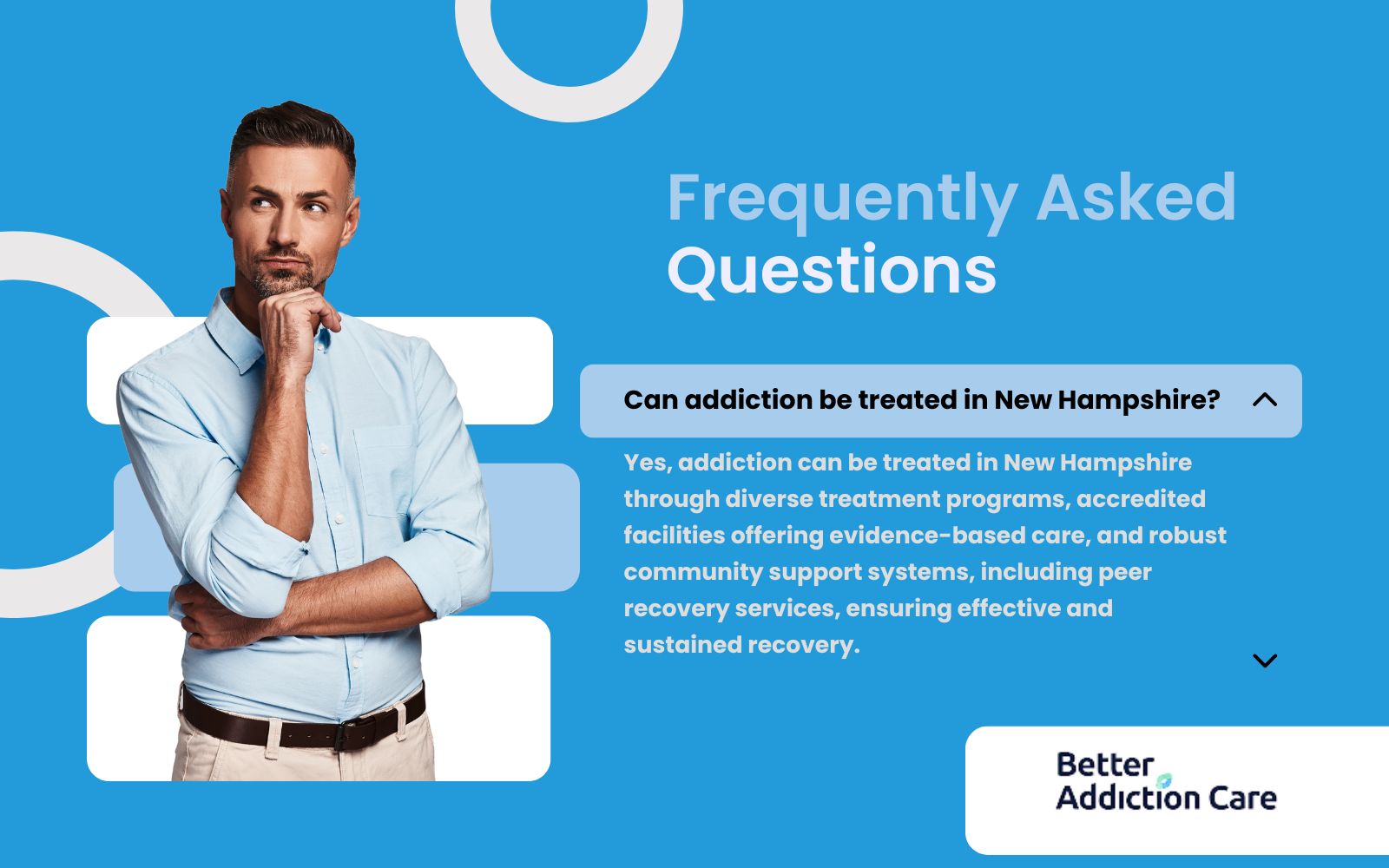
The state of New Hampshire has invested in expanding its recovery support systems, including community-based programs and peer recovery services, which play a vital role in sustaining long-term sobriety.
What is the state of New Hampshire?
The state of New Hampshire is in the northeastern United States, is bordered by Massachusetts to the south, Vermont to the west, Maine and the Atlantic Ocean to the east, and the Canadian province of Quebec to the north. New Hampshire’s population was 1.38 million, with a slight female majority in 2024, females comprising 50.7% of the population. Economically, New Hampshire is relatively affluent, with a median household income of $90,845 in 2024, reflecting an 8.86% increase from the previous year. New Hampshire's economy accounted for 0.4% of the U.S. economy in the third quarter of 2024, ranking 40th among states and Washington, D.C. Despite its small size, New Hampshire maintains a strong economic position within the nation.
What is the population of New Hampshire?
The population of New Hampshire is 1,402,054, with an almost even gender distribution: males account for 49.99% and females 50.01%. The age demographics reveal a diverse spread, with 4.46% of the population under five years old and 18.57% under 18 years. A significant portion falls in the working-age bracket, including 6.07% in the 20–24 age group and 7.27% in the 55–59 range. Meanwhile, 18.97% of residents are aged 65 and older, reflecting New Hampshire’s aging demographic. Among older adults, 7.03% are in the 65–69 age range, while 2.06% are 85 years or older. This balance across age groups highlights New Hampshire’s varied population structure, with a considerable representation of both younger and older residents.
What is the income of people from New Hampshire?
The income of people from New Hampshire is $48,250, per capita income. In New Hampshire, the median household income is $96,838, reflecting the state's relatively high economic standing. Income levels vary notably across different age groups and between genders. Householders aged 45 to 64 have the highest median household income at $116,212, followed by those aged 25 to 44 with a median income of $107,004. In contrast, householders aged 65 and over have a median income of $63,354, reflecting a decrease in earnings post-retirement.
Gender disparities in income are also evident. For all workers aged 15 and older, the median income is $54,066 for males and $35,862 for females, indicating that women earn 66 cents for every dollar earned by men. This 34% gender pay gap highlights significant income inequality within the state of New Hampshire.


